How to Introduce a Guest Speaker (with Examples)
May 25, 2023

Introducing a guest speaker is an important responsibility that sets the stage for their presentation and creates an atmosphere of anticipation. A well-crafted introduction not only provides essential information about the speaker but also captivates the audience and builds excitement. In this article, we will explore the art of how to introduce a guest speaker and how to craft a brilliant script for introducing a guest speaker.
From the best way to introduce a speaker to example speeches and tips for making a memorable impact, we will equip you with the tools to deliver introductions that engage, entertain, and leave a lasting impression.

What Is the Best Way to Introduce a Speaker?
Introducing a speaker effectively requires careful planning and consideration. Here are some key elements to keep in mind for how to introduce a guest speaker successfully.
1. Research and gather information.
Before introducing the guest speaker, conduct thorough research to gather relevant information about their background, achievements, and expertise. This will help you create an introduction that is both personalized and impactful.
2. Establish credibility.
Highlight the speaker’s credentials and accomplishments to establish their credibility in the eyes of the audience. Share their relevant experience, expertise, and any notable achievements that are relevant to the topic of their presentation.
3. Create a connection.
Find a compelling way to establish a connection between both the speaker and the audience. This can be through shared interests, experiences, or values. For example, if you’re introducing a guest speaker at your university who happens to be an alumnus of your school, make sure you draw attention to that in your introduction. Creating a relatable connection helps the audience connect with the speaker right from the start.
4. Build anticipation.
Engage the audience’s curiosity by giving a glimpse of what the speaker will later cover in their presentation. Tease key points, intriguing anecdotes, or unique perspectives that the audience can look forward to during the talk. This builds anticipation and captures attention for the following presentation.
5. Keep it concise and engaging.
Aim for a concise, but also interesting, introduction. Use short, direct sentences that convey information clearly. In addition, avoid lengthy biographies or unnecessary details that may lose the audience’s interest. Finally, craft your words carefully to maintain a lively and engaging tone.
How to Use AI to Practice Introducing a Guest Speaker
When it comes time to practice your guest speaker introduction speech, Yoodli , an AI-powered communication coach, becomes your invaluable practice partner. With Yoodli’s cutting-edge technology and generative AI , you can rehearse and refine your introduction in a virtual, judgement-free environment. Its personalized feedback helps you fine-tune your tone, pacing, and overall delivery, ensuring that you make a powerful impact when introducing a guest speaker.

Furthermore, Yoodli automatically generates a transcription of your speech, analyzing it for keywords. This means you can get a sense of how your audience might interpret your speech’s overall message and main points. With Yoodli’s assistance, you can gain confidence, practice your high income skills (like your storytelling skills, for example) and create an introduction that captivates as well as energizes the audience.
Examples of How to Introduce a Guest Speaker
To illustrate the power of a great guest speaker introduction, let’s take a look at an example of how to introduce a guest speaker.
Example of a general introduction for a guest speaker
Good morning, all! Today, we have the privilege of being in the presence of a true visionary and leader in the field of environmental sustainability. Our guest speaker has dedicated her career to finding innovative solutions for a greener and more sustainable future. [Speaker’s name], the CEO of [organization/company name], has successfully spearheaded numerous initiatives that have had a profound impact on our environment. Under her leadership, the company has revolutionized the way we approach sustainability challenges, pushing boundaries and inspiring change. With over two decades of experience in environmental engineering, [Speaker’s name] has been at the forefront of designing groundbreaking technologies and implementing sustainable practices in industries ranging from renewable energy to waste management. Her expertise has earned her international recognition and multiple prestigious awards. But it’s not just her professional achievements that make her special. [Speaker’s name] is a passionate advocate for educating the next generation on the importance of environmental stewardship. Her engaging speaking style and ability to connect with audiences of all backgrounds make her an inspiration to many. Today, [Speaker’s name] will be sharing her insights on how we can create a more sustainable future through innovation and collaboration. Get ready to be inspired, challenged, and empowered to take action. Please join me in giving a warm welcome to the exceptional [Speaker’s name]!
This example highlights the speaker’s credentials, builds a connection, creates anticipation, and sets the stage for an engaging and informative presentation.
Example of a personal anecdote for a guest speaker introduction
“Picture this: It was a sunny afternoon in the heart of our city, and I found myself walking through the bustling streets, surrounded by the sound of honking cars and the hum of conversation. Amidst the chaos, I stumbled upon a small park nestled between towering buildings — a hidden oasis of greenery and serenity.
As I entered the park, I noticed a group of children huddled around a captivating woman who stood in front of a majestic oak tree. It was none other than our esteemed guest speaker, [Speaker’s name]. She was engaging the children in a lively discussion about the wonders of nature and the importance of preserving our environment.
What struck me most was the way [Speaker’s name] effortlessly connected with these young minds, sparking their curiosity and inspiring them to take action. I watched as she shared stories of her own childhood adventures exploring forests, climbing trees, and discovering the beauty of our natural world.
In that moment, I realized the profound impact [Speaker’s name] had on these children: instilling a deep love and respect for the environment. Her passion was contagious, and it reminded me of the power we all possess to make a difference, no matter how small.
From that day forward, I became an avid follower of [Speaker’s name]’s work. Her commitment to environmental stewardship and her ability to connect with people from all walks of life is truly remarkable. Today, we have the incredible honor of welcoming her to this stage to share her insights and inspire us all to join the movement for a greener and more sustainable future.
Please finally join me in giving a warm welcome to the extraordinary [Speaker’s name]!”
What Do You Say First When Introducing a Guest Speaker?
The first few sentences of a guest speaker introduction are crucial in capturing the audience’s attention and setting the tone for the entire introduction. Here are some effective opening lines to consider adding to your script when introducing a guest speaking.
1. Engage listeners with a thought-provoking question.
Start with a thought-provoking question related to the speaker’s topic or expertise. This immediately grabs the audience’s attention and, what’s more, encourages them to actively participate in the introduction. For example: “Have you ever wondered how a single individual can make a significant impact on global environmental issues?”
2. Begin with a captivating anecdote or story.
Introduce the speaker by sharing a captivating anecdote or story that relates to their work or accomplishments. This narrative approach instantly draws the audience in and also builds an emotional connection.
3. Use a powerful quote.
Start with a powerful quote that encapsulates the essence of the speaker’s message or expertise. Quotes are attention-grabbing and can also convey a sense of authority and relevance. For example: “As Albert Einstein once said, ‘We cannot solve our problems with the same thinking we used when we created them.'” You can find some powerful quotes from the best motivational speeches , too.
4. Make a bold statement.
Begin your script to introduce your guest speaker with a bold and impactful statement that immediately captures the audience’s attention. This statement should be concise yet intriguing, sparking curiosity as well as setting the stage for the speaker’s presentation. Attention getters are perfect for this. For example: “Today, you’re about to witness a groundbreaking approach to tackling one of the most pressing challenges of our time: climate change.”
Remember, the opening lines of your script to introduce a guest speaker are the gateway to engaging the audience and setting the stage for a memorable presentation. Choose an approach that aligns with the speaker’s personality as well as the event’s atmosphere, and don’t be afraid to be creative and captivating.
The Main Takeaway
Giving an introduction for a guest speaker is an art that requires careful planning, research, and an understanding of the audience’s expectations. By following the principles discussed in this article and using examples as inspiration, you can deliver introductions that engage, entertain, and leave a lasting impression. Remember, the goal is to set the stage for the speaker’s presentation and create a sense of excitement and anticipation.
So, go ahead, embrace the power of a well-crafted introduction, and make every guest speaker’s presence an unforgettable experience for your audience.
Start practicing with Yoodli.
Getting better at speaking is getting easier. Record or upload a speech and let our AI Speech Coach analyze your speaking and give you feedback.
- PRO Courses Guides New Tech Help Pro Expert Videos About wikiHow Pro Upgrade Sign In
- EDIT Edit this Article
- EXPLORE Tech Help Pro About Us Random Article Quizzes Request a New Article Community Dashboard This Or That Game Popular Categories Arts and Entertainment Artwork Books Movies Computers and Electronics Computers Phone Skills Technology Hacks Health Men's Health Mental Health Women's Health Relationships Dating Love Relationship Issues Hobbies and Crafts Crafts Drawing Games Education & Communication Communication Skills Personal Development Studying Personal Care and Style Fashion Hair Care Personal Hygiene Youth Personal Care School Stuff Dating All Categories Arts and Entertainment Finance and Business Home and Garden Relationship Quizzes Cars & Other Vehicles Food and Entertaining Personal Care and Style Sports and Fitness Computers and Electronics Health Pets and Animals Travel Education & Communication Hobbies and Crafts Philosophy and Religion Work World Family Life Holidays and Traditions Relationships Youth
- RANDOM QUIZ
- Browse Articles
- Learn Something New
- Quizzes Hot
- This Or That Game New
- Train Your Brain
- Explore More
- Support wikiHow
- About wikiHow
- Log in / Sign up
- Occupations
- Performing Arts Careers
How to Write and Deliver an Engaging Guest Speaker Introduction
Last Updated: April 3, 2023 Fact Checked
Sample Speeches
Writing the introduction, delivering the speech, expert q&a.
This article was co-authored by Deb DiSandro and by wikiHow staff writer, Ali Garbacz, B.A. . Deb DiSandro is the Owner of Speak Up On Purpose, an organization dedicated to improving and teaching public speaking. Deb has over 30 years of experience as a national speaker and has presented at the Erma Bombeck Writer’s Conference and the National Society of Newspaper Columnists. She was awarded the National Speakers Association Member of the Year 2007 and has been published in Writer's Digest, Daily Herald, Women's Day, and Better Homes & Gardens. There are 8 references cited in this article, which can be found at the bottom of the page. This article has been fact-checked, ensuring the accuracy of any cited facts and confirming the authority of its sources. This article has been viewed 1,193,510 times.
Introducing a guest speaker is quite an honor. As the introducer, you get the audience excited about the talk they’re about to hear and play a crucial role in connecting the speaker to their audience on a more human level. Writing the perfect introduction speech requires some research and rehearsal on your part, but rest assured that you’ll be left with a speech that’ll leave your audience wanting more. Keep reading for our complete guide to writing the best introduction speech. Also, take a look at the samples we’ve included to get help you get started.
Things You Should Know
- Establish the guest speaker’s credibility by mentioning notable achievements and experiences that relate to the topic of their speech.
- Share a quick anecdote or surprising fact about the guest speaker to paint a picture of their personality and character.
- Get the audience excited for the upcoming presentation with a short sentence stating what the guest speaker will be talking about.
- Wait until the very end to introduce the guest speaker by their full name and title.

Researching the Speaker

- When the speaker provides an introduction for you, use it. Read it over a few times and don’t hesitate to ask them for any clarification if you need it.

- For example, if the speech is about encouraging young girls to learn computer programming, don’t spend time explaining how the speaker can teach these skills to adults.
- Additionally, if the audience is mostly people who work in the education field rather than computer programming, avoid using a lot of jargon specific to computer programming so the audience can follow along better.

- Another method is to ask the speaker for their resume. Use this to pick out their most notable achievements to help establish their credibility.
- A good introduction goes beyond just reciting the speaker’s personal history. However, noting their most relevant and impressive achievements will help establish them as an authoritative figure to the audience.

- Always get the speaker’s permission before using these details. If you need to use this information, have an explanation ready as to why it’s important to your introduction.

- Be careful if you’re using pieces from another speech since it is copyrighted material and can’t be used without the speaker’s permission. Talk directly to the speaker about using these portions, or rephrase the section in your own words.

- “Many don’t know that John Doe originally went to school for law, but ended up choosing psychology instead. Just like many of you, he didn’t have much of an idea of where his life would take him. Little did he know that his legal studies would actually help him to become one of the most renowned therapists we know today.”

- Avoid using overly casual language to refer to the speaker, such as “guy,” “girl,” or “kid.” Instead, use “person,” “woman,” or “man.”

- “Jane’s passion for creative writing goes back to her high school days where she began the draft for her very first novel at the age of 15. By the time she was entering her sophomore year of college at 19 years old, she had already published her first book.”
- “John has received recognition and praise from some of the largest Fortune 500 companies for his dedication to creating curriculums to help strengthen teamwork in the workplace. He’s received multiple awards for his work and has even gone on to write a book sharing his unique insights and perspective.”

- “Jane will tell you exactly how you can manifest every single one of your goals by making just five simple changes in your daily life.”
- “John is here today to share the secret to maximizing your savings so you can live freely without ever having to worry about finances again.”

- “John and I met a few years back and immediately bonded over the struggle of maintaining a healthy work-life balance. I’m sure many of us can relate to this.”
- “Jane’s book on navigating childcare in our current economy struck me at a very deep level. I’ve never read such relatable and honest words, and her work has given me comfort and reassurance during these unpredictable times.”

- For example, you might say, “John Smith’s story working in the lumber industry inspired me to go out and build a cabinet. Unsurprisingly, it fell apart within five minutes of being built. I went back to him, and he was sure to reassure me that it’s a practice that requires much patience.”

- “Please join me in welcoming Dr. John Smith!”
- “Here to discuss her newest book, “How to Live a Happier Life,” please give a warm welcome to Jane Doe.”
- “Here to share his unique perspective on the current political climate, please welcome Professor John Doe.”

- Also, practice using a friendly and relaxed tone when you give your speech to avoid coming off as super stiff and nervous.
- To overcome stage fright , recite the introduction while looking in a mirror. Once you feel comfortable, rehearse it in front of family and friends.

- For example, “Good evening. My name is Alex Brown, and I’m the organizer of this event.”
- If everyone in the audience is familiar with you, there’s no need to introduce yourself.

- Get the speaker’s approval of the introduction you’ve written. Thanks Helpful 0 Not Helpful 0
- Forget about cliches such as “This person needs no introduction.” Instead, focus on making your introduction unique and descriptive. Thanks Helpful 0 Not Helpful 0
- Ask the speaker to revise a provided introduction if you don’t feel that it’s right for the audience they’ll be presenting to. Thanks Helpful 0 Not Helpful 0

You Might Also Like

- ↑ https://www.dacdb.com/Rotary/Accounts/5110/Downloads/30398/how-to-introduce-a-speaker.pdf
- ↑ https://www.press.umich.edu/pdf/9780472035090-unit1.pdf
- ↑ http://canuwrite.com/speech_introduce.php
- ↑ http://www.write-out-loud.com/introduction-speech.html
- ↑ https://hbr.org/2016/10/how-to-memorably-introduce-another-speaker
- ↑ https://westsidetoastmasters.com/resources/talk_your_way/ch15.html
- ↑ https://publicwords.com/2011/11/26/how-to-introduce-a-speaker-the-art-of-giving-and-receiving-a-great-introduction/
- ↑ http://www.publicwords.com/2011/11/26/how-to-introduce-a-speaker-the-art-of-giving-and-receiving-a-great-introduction/
About This Article

Before introducing your guest speaker, introduce yourself in case there are people in the audience who don't know you. Then talk about the speaker’s background and qualifications, and give the audience a high-level overview of what they might learn from the presentation. See if you can include a short, personal anecdote about the speaker, like "I read their book and really loved it," for example. Try to keep your introduction to less than 3 minutes, and finish it by welcoming your speaker and telling the audience their name. For more advice on introducing a guest speaker, including how to research them in advance, keep reading! Did this summary help you? Yes No
- Send fan mail to authors
Reader Success Stories
Judith Williams
Jun 6, 2016
Did this article help you?

Lorenz Fernando
Mar 18, 2018
Aayisha Sakeer
Jan 30, 2018
Aug 9, 2021
Tyler Danty
Oct 2, 2017

Featured Articles

Trending Articles

Watch Articles

- Terms of Use
- Privacy Policy
- Do Not Sell or Share My Info
- Not Selling Info
wikiHow Tech Help Pro:
Level up your tech skills and stay ahead of the curve
- Sidebar Menu
- Speech Samples
- Letter Samples
- Essays Samples
- Grammar Tips
- Funny Anecdotes
- Profound Anecdotes
- Press release Samples
- Recommendation Samples
- Wedding vows Samples
- Article Samples
- Bibliography Samples
- Condolence Samples
- Eulogy Speech
Introduce a guest speaker speech sample
This page contains a sample introduction speech template for introducing a guest speaker or key note speaker for an event, banquet, conference, lecture and more. It also contains tips for how to write an introduction speech and techniques for delivering introductory remarks.
Sample introduction speech
Ladies and gentlemen, I am (say your name) and I am the (say your title in relations to why you're introducing the speaker, for example, you are president of an organization). I am so pleased to be with you tonight and to have the chance to introduce our guest speaker, (say speakers name). He / She is the (say speaker's positions in relations to why they're speaking). He / She has been one of the main proponents of this program for several years, and it a true stand out in this field. He / She has a great understanding of the program and a great appreciation of what it takes to truly make (state theme or topic of event or conference) continue on a path of progress, and a remarkable vision of the future of (State topic). Besides that, He / She (Add a few interesting personal notes here. Mention if the person was the first to do something, if they have published anything, have held impressive positions, done impressive things, etc. Use the speaker's bio or ask them or their staff for this information). Finally, he / she is also just a fascinating person and we're all in for a treat today. Without further ado, please join me in welcoming (name of speaker).
Tips for introducing a guest speaker
1. Don't talk too long. Keep your introduction to between 45 seconds to 3 minutes. 2. Bios are a great place to get information. Almost all speakers will have a bio online or the event planner may have a copy of their bio. You can also search their name online for other interesting tidbits about them, but do not to include something that may be controversial or potentially embarassing to them, unless you ask them first. 3. Ask the speaker what he or she would like you to say in their introduction. If they are very high-profile and hard to speak with personally, ask their staff or administrative assistant for information. 4. If possible, find out what the speaker plans to focus on in advance, so you don't imply they will be speaking about one thing when they will actually talk about something else. 5. If it is a professional forum, do not talk about the guest speaker's family unless you ask them first. 6. Try to find transcripts of other speeches they have done online. Often the introductory remarks will be included and you can use them to frame your own remarks.
Did you like this sample speech template for introducing a guest speaker or key note speaker? Since you were interested in this introductory speech, chances are you will like the following topics as well: Itroductory letter for Conference or Event and Anecdotes for speakers .
More information : We hope this page was helpful and provided you with some information about How to introduce a guest speaker sample template . Check out our main page for more articles here Can U Write .
All materials on this page are under the copyright of canuwrite.com These speech and letter sample materials may be re-used for free but may not be reprinted or redistributed without attribution to canuwrite.com
Simplify, Multiply, and Thrive!
Guest Speaker Introduction: How to Prepare, Write and Deliver
Introducing a guest speaker is more than just a routine task. It’s an important step for both the audience and the speaker. For the audience, a good introduction sets the stage, providing context and sparking interest in what the speaker has to say. It helps them understand why they should listen and what they can expect to learn.
For speakers, a thoughtful introduction acts as a warm-up, giving them credibility and a connection with the audience. It’s a way of showing respect and appreciation for their expertise and the effort they’ve put into their presentation.
I’ll be sharing some practical tips on how to introduce a guest speaker effectively. Whether it’s a formal event or a more casual setting, the right introduction can make a big difference in how the speaker’s message is received. So, let’s get started on learning how to make every introduction clear, concise, and engaging.
Introducing a guest speaker.
I once heard a guest speaker’s introduction that was longer than the speech. At first, I was amused because the person assigned to introduce the guest speaker was introduced for about 11 minutes.
He greeted everyone on the stage. He made some comments about the dignitaries who seemed to love the spotlight focused on them. The last time I saw something similar was at a conference of barangay officials.
At first, he read the curriculum vitae word for word. He mentioned every award and degree earned. It was evident that the speaker stayed in school longer than any of us.
Then, he shared stories of how he met the speaker, his first impressions, and the common values they hold. I counted that he mentioned “finally” seven times to signal that he was about to call the speaker.
“Without further ado, let us welcome my idol, the one and only, the honorable…”
It was not the longest introduction I have seen, but nine minutes is a long time to introduce a speaker.
When I was in college, I realized that the more insecure the speaker is, the longer the introduction becomes.
For example, the President of the Philippines is often introduced only with “Ladies and gentlemen, the President of the Republic of the Philippines.” The more dignified the person is, the shorter the introduction is.
I am not suggesting that introducing a speaker is not important. An excellent introduction by the guest speaker establishes rapport and trust, and it helps the audience understand why they must stay and listen.
You can write an excellent introduction to the guest speaker. It is easier than most people imagined. You can learn patterns and ways of delivery.
And I will share with you some tips that you will not find elsewhere as I am going to speak based on experience.
Jef Menguin
Start typing and press enter to search.
- Games, topic printables & more
- The 4 main speech types
- Example speeches
- Commemorative
- Declamation
- Demonstration
- Informative
- Introduction
- Student Council
- Speech topics
- Poems to read aloud
- How to write a speech
- Using props/visual aids
- Acute anxiety help
- Breathing exercises
- Letting go - free e-course
- Using self-hypnosis
- Delivery overview
- 4 modes of delivery
- How to make cue cards
- How to read a speech
- 9 vocal aspects
- Vocal variety
- Diction/articulation
- Pronunciation
- Speaking rate
- How to use pauses
- Eye contact
- Body language
- Voice image
- Voice health
- Public speaking activities and games
- About me/contact
- How to write an introduction speech
Introduction speech for a guest speaker
How to write a good introduction speech step by step
By: Susan Dugdale
If you've been asked to give the introduction speech for a guest speaker you're in the right place.
Everything you need to prepare it is here. Follow the steps and you'll have an introductory speech you'll be proud to deliver.
What you'll find on this page:
- an overview of the purpose of an introduction speech for a guest speaker
- the content you're expected to cover
- an organizational pattern or template to follow
- an example introduction speech
- 6 important tips to use to ensure your speech is a success
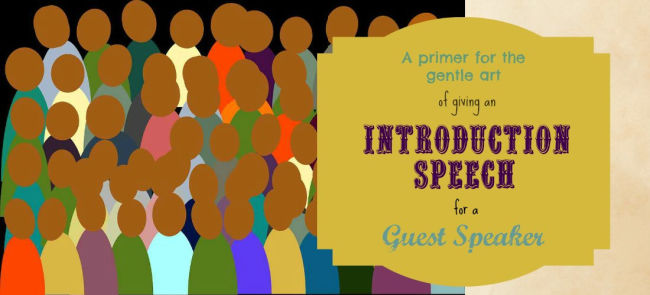
The function of an introduction speech
Let's start with the purpose of the speech. When you understand what the speech is supposed to achieve you'll find it much easier to write.
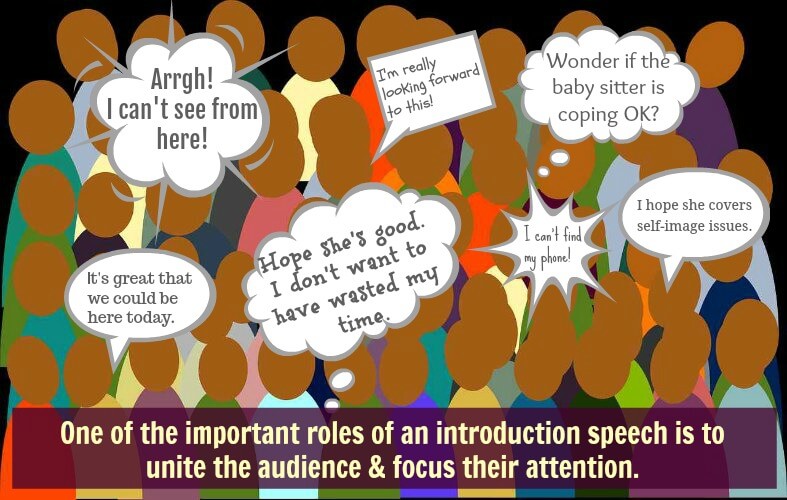
The job of an introduction speech is to:
- introduce your guest speaker,
- give them a warm welcome,
- and create ready-and-motivated-to-listen anticipation in the audience.
Essentially you are the warm-up act. Your task is to focus and unite the audience members, to get them ready for what is to come.
Return to Top
To prepare your introduction speech you'll need:
- the guest speaker's name and, if they have one, their title. For example; Judge, Sir, The Right Honorable... Do make sure you can say their name properly and easily! If you're in doubt get the correct pronunciation from your guest speaker and practice. Also ask if they have personal pronoun preferences. Eg: they/them, she/her, he/him...
- the guest speaker's biography or the credentials of the speaker Sometimes you'll be given what the guest speaker wants said about themselves. If that isn't provided select events, achievements and qualifications to support establishing him/her as an authority within the context of the occasion. And do check that your guest is happy with what you are preparing to say about them.
- attention getters or a surprise to delight the audience, something that is not commonly known, and something revealing the personality or humanity of the person.
How to organize your material
- Build excitement or interest by adding one piece of information after another.
- Make the speaker's name and their speech title, the climax and end of your speech.
To show you how it's done I've put together an...
Introduction speech example
Let's put the speech in context to help you make sense of it.
The setting for this fictitious introduction speech is a conference for an organization called " Women in Leadership" . The audience are primarily women drawn together through an interest in leadership roles.
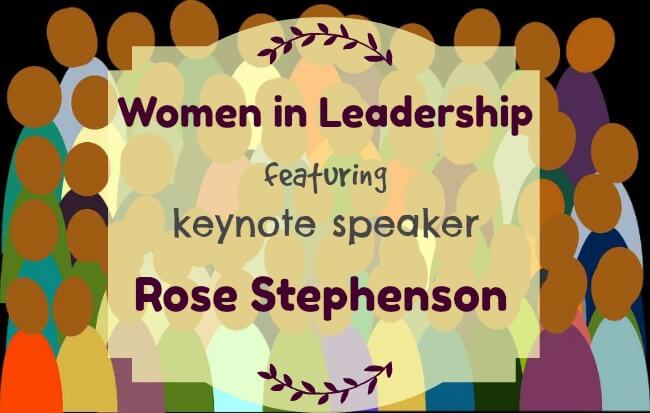
At the end of the speech, the speaker will lead the clapping as Rose Stephenson, the keynote speaker being introduced, takes center stage.
Now here's the introduction speech text.
Now here's the introduction speech text
" She's been a stalwart member of "Women in Leadership" for the last ten years. Over that time she's served in every office: secretary, treasurer, chairperson, chief fundraiser, education officer... to name just a few, and in some roles several times over.
Her passionate dedication to promoting public speaking as an important component of empowerment is inspiring. We estimate that she has personally mentored at least 100 new speakers and has set an extraordinary "yes, you can" example for many more. We see her as capable, confident and fluent: never at a loss for words. But what you probably don't know is that this women once stuttered, stammered and blushed.
Yes, she was often temporarily paralyzed, struck dumb by the mere thought of standing in front of an audience to speak.
How she got from awkward tongue tied silence to becoming an eloquent front line spokesperson is the story she will share with us tonight.
Ladies, without further ado, it's with great pleasure, I give you... Rose Stephenson on "Speaking To Lead!"
Say the speech out loud! Use it as a template!
Try saying it out loud to get the flow of it.
If you like it, use it as a model for the introduction speech you need to write.
6 tips to make your introduction speech successful
1. consider tone and language use.
Is what you've prepared appropriate for the occasion, audience and your guest speaker? Have you avoided using a string of clichés?
2. Check the length of your speech

Pertinent and pithy: a short speech is what you want. One to two minutes should be enough.
Test it out loud with a timer and trim if necessary.
My example speech is 171 words long. That will take approximately 1 minute 30 seconds to say depending on the speaker's rate of speech.
For more on: the number of words per minute in a speech . (This page has estimations for the number of words per minute spoken at a slow, medium and fast rate for speeches from 1 - 10 minutes long.)
3. Resist exaggerating or "puffing up" the speaker's achievements
First impressions count. You don't want to talk about your guest in a way that may embarrass and cause the audience to question their right to be there.
4. Always check your facts
Beware the horror of getting your facts muddled and, if you wish to mention something that may be sensitive, ask permission before you announce it in front of an audience.
5. Remember you are not the main speaker, or the star of the show
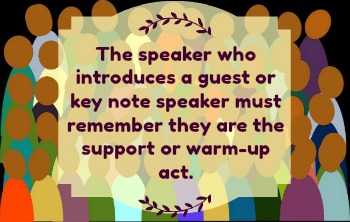
You've done a good job when you cover just enough to make the coming speech eagerly anticipated.
Please do not stray into telling the audience what the guest speaker's speech will cover in detail. That's terribly unfair on the speaker!
6. Rehearse your speech
Practice out loud until you are confidently fluent and able to convey the pleasure or enthusiasm the audience needs to get them in the right frame of mind.
For more: how to rehearse a speech well
For more: how to use your voice expressively
Other related pages you may find useful:
- How to give a self-introduction speech (with an example of a brief speech to introduce yourself to fellow workshop participants)
- How to write a welcome speech (with an example of a short welcome speech to open an event)
speaking out loud
Subscribe for FREE weekly alerts about what's new For more see speaking out loud

Top 10 popular pages
- Welcome speech
- Demonstration speech topics
- Impromptu speech topic cards
- Thank you quotes
- Impromptu public speaking topics
- Farewell speeches
- Phrases for welcome speeches
- Student council speeches
- Free sample eulogies
From fear to fun in 28 ways
A complete one stop resource to scuttle fear in the best of all possible ways - with laughter.

Useful pages
- Search this site
- About me & Contact
- Blogging Aloud
- Free e-course
- Privacy policy
©Copyright 2006-24 www.write-out-loud.com
Designed and built by Clickstream Designs
- SUGGESTED TOPICS
- The Magazine
- Newsletters
- Managing Yourself
- Managing Teams
- Work-life Balance
- The Big Idea
- Data & Visuals
- Reading Lists
- Case Selections
- HBR Learning
- Topic Feeds
- Account Settings
- Email Preferences
How to Memorably Introduce Another Speaker
- Deborah Grayson Riegel

What to say to get your audience’s attention.
As a professional speaker and facilitator for over 20 years, I’ve been introduced more than a thousand times, by countless meeting planners, conference organizers, and team leaders. Nevertheless, most of the introductions have fallen into one of four categories:
- Deborah Grayson Riegel is a professional speaker and facilitator, as well as a communication and presentation skills coach. She teaches leadership communication at Duke University’s Fuqua School of Business and has taught for Wharton Business School, Columbia Business School’s Women in Leadership Program, and Peking University’s International MBA Program. She is the author of Overcoming Overthinking: 36 Ways to Tame Anxiety for Work, School, and Life and the best-selling Go To Help: 31 Strategies to Offer, Ask for, and Accept Help .
Partner Center

Introducing a Speaker Sample Script

NOTE – If you would prefer to watch a Video of this Topic, Scroll to the bottom of the Page.
Many people get asked to introduce a speaker at an event and have no idea how to do it. In this quick guide, we give you several different frameworks that you can use, as well as plenty of sample scripts and explain the questions you must ask both your speaker and your client before you start.
Key Points of a Great Speaker Introduction
A Biography is not an Introduction
- Grab the audiences attention
- Establish the importance of the Topic
- Establish the credibility of the Speaker
- Outline “What’s in it for Them”
- Say the Speakers name last
(adsbygoogle = window.adsbygoogle || []).push({});
Why do we introduce a speaker or performer.
There are many reasons why we have someone else introduce a speaker or an act rather than them just coming out on stage and beginning their presentation or performance. Understanding these is an important part of the process of crafting a great introduction. Here are some of the reasons…
- It shows respect for the speaker
- It settles the audience down and gets them focussed on the stage.
- Alternatively, it can hype the audience up and get them excited about what they are going to experience
- It gives a chance for the Production crew to correct the sound levels, lights and be ready with any audio/visual cues.
- It lets the audience know who this person is before they start, in case there is no printed program.
- It can link the content or the message of the speaker to the theme of the event.
- It can emphasise why this message is important to the group and why they should listen
- It can show why this person is qualified to speak about the topic and share their insights
- It can allow the speaker to get straight into the meat of their presentation
So, as you can see there is a lot going on behind even the simplest of introductions!
Before you start writing a Speaker Introduction!
Before you start writing an introduction, find out, does the speaker have a prepared Introduction?
If the person presenting is a professional speaker, e.g this is what they do for a living, they should have a standard introduction already prepared for you or better still, an introduction they have prepared specifically for this event. They will understand the importance of the introduction and how it can help them and their presentation succeed.
In reality however, not all professional speakers will provide you with a prepared introduction and most other non professional speakers will not provide one at all. They may not even be aware that they can do this.
What you will get in most situations is a Biography, which is not an Introduction and shouldn’t be read out “as is!” This is one mistake many people make. We will show you later in the article how to convert a Bio into an Introduction.
If you do get an introduction, either supplied by the booker, the client or the speaker themselves, use it as written. Don’t attempt to improve it. The only time to do this is if you see some glaring error or you really need to cut some time off, but you are going to find most provided introductions are carefully crafted and most will be quite succinct.
If you do add anything, say it before you start the provided introduction and then end on their words.
Speaking of time … if a Speaker does provide you a long winded introduction or insists that a video highlights package is run before they come on stage, make sure this is included in their presentation time!
I normally start timing a speaker after I leave the stage and they have started, but if they insist on a really long one or play a 5 minute video first, that should be part of their allocated time.
There is a bit of a trend for having a video play before they actually come on. It really is part of the presentation..
Notice, I have been referring to provided Introductions. These are not Biographies!
Often you will be provided with a Biography of the Speaker. The Client has probably recieved this from the Speaker or copied it from their website and it was useful to them in selecting the Speaker for the engagement. But these are seldom useful as Speaker Introductions.
A Biography, like a CV that you put together to help you obtain a job, lists all your Qualifications, Achievements, Career Highlights, Publications, Awards etc.
But your audience doesn’t really need to know all this! They don’t really care. They want to essentially know just three things.
- Is this Topic important?
- Is the Speaker qualified to talk about the Topic?
- What’s in it for them?
Don’t fall into the trap of just reading out a long Biography that you are given. We will show you later in the article how to quickly craft a strong Speaker Introduction.
It’s always a good idea if you can check directly with the speaker that the topic of their speech is unchanged.
Many speakers get booked many months before their presentations. In the case of large international events this may even be a year or so prior! In some cases a speech Topic or Title may change. The speaker may in fact have a totally different theme or presentation to what’s printed in the Agenda or in the notes provided.
If you craft a wonderful Introduction, touching on the theme or the importance of the speech, it helps if it’s in alignment.
Two strategies
Firstly, you should if at all possible talk to your speakers before you introduce them. There are many reasons for this, that we have discussed here. During this conversation you can check that the title and topic is much the same.
Secondly, if the Speaker has a Powerpoint Presentation to accompanies the speech you can usually see the first slide. This should alert you to the fact of a change early on. You will either see this when they are setting up on stage or you may be able t see it at the Audio Visual Desk if it is being controlled by the AV Team.
If you see there is an obvious change you can then find out more and alter accordingly.
Questions for Your Client
We already have a specific training that covers all the questions you should ask your client before an event, but here are a few that specifically relate to the introduction.
- What is the purpose of the whole meeting?
- What is the purpose of this speech?
- Why did you choose this speaker?
- Will I be provided with a Biography or a set Introduction?
The answers to these questions should provide you with a fairly solid base to work from, especially if you are going to follow the Introducing a Speaker Sample Script outlined below.
Speaker Introduction Framework 1
Here is a very solid framework to start with that I have used for many years.
I was taught this by Ron Tachhi who was a very successful speaker and then ran a large Speaker Bureau in Australia. His was based on a framework taught in the Toastmasters Training. (I should point out, I have modified the order of the 4 points as I feel it has much more impact done this way.)
The Speaker Introduction has 4 parts that address a different question in turn.
1/ Why this Subject?
Why is this subject important? This allows you to start with a bang – to pose a question, state an alarming fact, interesting insight or staggering statistic.
What you are trying to do here is to grab the audiences attention, stop them thinking about the previous presentation or even just to look up from their phone where they have been checking their email.
It can be as short as just a sentence or perhaps two or three to frame the topic.
“Did you know that there are more Shopping Malls in America than there are High Schools?”
“What do you think is the most common cause of death of children under 5 years worldwide?”
“A quick show of hands … Who here believes that (XXXXXX) is the biggest issue facing our industry at the moment?”
2/ Why this Speaker?
Next you need to establish the credibility of the speaker. This is where you mention some of the highlights taken from their Biography. Choose the most significant ones and importantly, the ones that relate most to the topic and theme.
You are positioning the speaker as the best person give insights and solutions to the subject.
3/ Why this Audience?
You now build a link between the Subject and the Audience. How does this subject effect them directly.
“You guys are leaders in our community … “
“These changes to the legislation and going to impact you more than most …”
“If you expect to earn more next year …”
4/ Why Now?
Why is it great to be learning this now?
What is the benefit to them?
What are they going to get out of it?
Why should they pay attention right now?
In Sales terms.. you heard about the pain, now here is the solution!
What’s in it for them!
You are picking up the momentum and building a little excitement.
“In the next 30 minutes you will learn …”
“Let’s get some inside secrets from someone who …”
Combining these 4 Parts together has a nice flow to it and it builds up to a strong finish.
Speaker Name Last
It’s usually better to end with the persons Name as the last thing you say.
If you were introducing me for instance you could say ….
“Would you please welcome to the stage, Timothy Hyde , the founder of ExpertMC.com.”
It’s far better to say …
“Would you please welcome to the stage, the founder of ExpertMC.com, Timothy Hyde ”
Length of Introduction
Depending on the circumstances you should really try and keep a Speakers introduction short and tight.
You can pack a lot into just 2 minutes!
Speaker Introduction Framework 2
There’s another element that you can add into any introduction and that is a more personal touch. This requires that you can contact the speaker before the event or at least have a few words with them on the day.
What you try and find out is some personal anecdote or connection that you weave into the speaker introduction.
It might be a connection to the group, the venue or the cause. It could be where they live, where they were born or where they are travelling to next. Hobbies and Sports Teams they follow are great ones, and I quite often ask … “what’s the essential album you like to listen to on a long car trip?”
As you can see these questions go beyond the normal level of formal introductions and add something a bit special. It also allows a bit of humour.
If you are introducing a number of speakers at one event you can use this technique with each one. After the first couple of introductions the audience will be expecting to hear it each time and it becomes a great “running gag.”
Should I stay or Should I go?
The other question I get asked a lot is “Should I give the speaker introduction and then leave the stage or should I give the introduction and then wait for the speaker to get to the lectern / centre stage and then leave?
My feeling on this is you should wait at the lectern and there are a number of reasons for this.
I like to control the audience focus!
If I walk off before the speaker comes on, the audience don’t know where to look.
I like to give the Speaker Introduction and gesture towards where they are coming from. Once they are onstage and moving to the centre, everyone will be looking at them. I then move slightly to the side but wait for them. Once they nearly get to the speaking position I extend my hand in welcome, shake hands and then leave the stage.
However, I don’t completely leave. Speakers sometimes are nervous, they might drop their notes, fumble with the control button for the slides etc. I’m close enough that I can respond if needed. Once they start I can then proceed completely offstage.
Final Thought on Introducing a Speaker
One of the joys of being an MC is that you get to meet and work with some amazing speakers.
Over the years I’ve introduced – famous Sportsmen, Entrepreneurs, Explorers, Prime Ministers, Astronauts, Inventors, life changing Surgeons and many more.
And every time you witness a great speech, that you introduced well, you can think to yourself … “I helped make that a success!”

Timothy Hyde
Widely acknowledged as one of Australia's busiest & best MC's and a global authority on the MC Industry, Timothy Hyde shares his expertise and insights into this fascinating Professional Speaking niche via this site and a dynamic YouTube channel. His best selling book The ExpertMC Toolkit and Resource Manual has helped thousands of people worldwide improve their Emcee skills and in many cases, start earning a living by taking on the role.
Check out these other very popular articles
Great Opening Lines for Emcee
Prefer to watch a Video? Here's one on the same Topic! https://youtu.be/wbl7TgacF04 An Insiders Guide to Great Opening Lines for any MC or Speech. A great Opening Line should aim to...
Emcee Script - How to Thank a Speaker
Note - If you would prefer to watch a video on this topic, scroll to the bottom of the article. Is there a set formula for thanking a Guest Speaker at a function or event? While there is no set...

Introduction Speech Examples That Increase Speaker Credibility

You may be called upon to introduce yourself in a speech or introduce a speaker, a guest, an employee, a product, or a concept. Your job is to grab the audience’s attention so that they are ready to receive the main message. Here are some introduction speech examples to help you.
Table of Contents
What Is A Speech Of Introduction?
In public speaking, a speech of introduction introduces someone to the audience members. It can also be a self-introduction speech wherein the speaker does the introduction.
Whether the speaker will deliver an informative speech, persuasive speech, or any type of speech, the speech of introduction aims to help establish the speaker’s background. Who are they? What do they do? What makes them credible to talk about the topic they will discuss?
How Do I Start A Speech To Introduce Someone?
If your job is to introduce someone before their speech or presentation, the first fundamental thing to remember is to keep things short and sweet. Your goal is to set the tone and entice the crowd to listen to the rest of the speech the speaker will deliver.
When writing such a speech, you must bear in mind the following:
- You must grab the audience’s attention. Though it depends on the setting and theme of the occasion, the general rule is to have an upbeat opening that will help you grab the audience’s attention. You can begin with a simple “Good morning/Good evening, ladies and gentlemen”; then state the purpose of your speech — introducing the topic, the purpose of the speech, and the guest speaker.
- You must effectively establish the speaker’s qualifications. Introduction speeches are considered commemorative speeches in the sense that they celebrate the achievements and milestones of someone. In your speech, you must concisely provide an overview of the qualifications, expertise, and relevant accomplishments of the individual you’re introducing. This is a way to establish credibility and entice the audience to listen attentively.
- You must make the speaker welcome. As someone tasked to introduce the speaker, you serve as the bridge that helps connect them with the audience. However, your goal isn’t just to prepare the audience for the speech. You must make the speaker also feel welcome with an enthusiastic tone and body language. If you have personal anecdotes or connections to share, you can do so — briefly and with the utmost authenticity.

What Is A Welcome Speech, And Can It Be Used to Introduce Someone?
A welcome speech or address is a type of speech that sets the mood for a specific event.
While it can serve as an excellent introduction to the guest speaker, it’s also an opportune time to emphasize what the event is all about and acknowledge the organization or individual behind the occasion. An excellent welcome speech can also preview what the attendees can expect — apart from the remarks by the speaker.
How Do You Introduce Yourself In Speech Examples?
In speech writing and public speaking, knowing how to introduce the speaker properly is essential. In some instances, speakers briefly introduce themselves before their speech proper. They can also incorporate it into their speech opening.
In any self-introduction speech example (check out this TED Talks compilation of intros), you will observe that there are common ingredients behind an effective self-introduction speech.
This speech must help the audience get to know you, showcase your qualification (without sounding boastful), establish connections with and create value for your listeners, and introduce your speech topics and main points. This portion aims to give your audience a reason to stick with you and hear the rest of your speech. Also, note that first impressions last, so you must ensure your intro is impactful and engaging.

See the examples below to give you an idea of how to introduce yourself while still having effective attention-getters (e.g., a rhetorical question, an anecdote, a statistic, or a bold statement).
- “Good morning/afternoon/evening. I’m X, and I’m here to talk about Y. To begin, I’d like to share a story…”
- “Have you heard about X? I’m Y, and today, I’ll share with you my thoughts about…”
- “What if overcoming your biggest fear doesn’t have to be as hard as you thought it would be? My name is X. And I’m a testament to how….”
- “Hi, I’m X, and I wanted to know: How many of you have experienced Y?”
- “Did you know that X? My name is Y, and I was asked to discuss…”
What Are Introduction Speech Examples For?
When you look for speech examples for a short introduction of speech or a self-introductory speech, you’ll find that this type of speech has a great variety.
You can use it to introduce a public speaker and a guest. In a business setting, you can also use an introduction speech to introduce an employee or present a product. Even in academe or civilian environments (e.g., you’re a high school public teacher or a personal development coach), you can count on an introduction speech to introduce a concept.
Here’s a template you can follow.
A public speaker or a guest
- Attention-getter
- State your role
- Introduce the speaker/guest
- Note the speaker/guest’s credibility and contributions
- State the topic
- A personal connection, story, or experience
- What can the audience expect/ how can the speaker provide value
- Transition to the speaker

An employee
- Introduce the employee
- Highlight their tenure/experience, achievements, skills, and qualities
- State what the employee will be discussing
- State the significance of the employee’s work/impact on the audience
- Transition to the employee
A product or a concept
- Attention-getter
- State the purpose of your speech
- Introduce the product or concept
- Share its significance
- Share its benefits
- Showcase the key features
- Do a demonstration
- Explain the potential impact
- Cite supporting facts
- Deliver a strong call to action
- Transition to the next phase or proportion of the event

No matter who or what you’re introducing in your speech, the key is to create a concise yet comprehensive one. Your speech must prepare the audience and make the speaker feel welcome. While remaining factual and genuine, you must write and deliver this piece in a way that generates interest and sets an excellent tone for the speech proper — and the rest of the event.
Recent Posts
Active Listening Absorbs The Whole Message, Not Just The Words
Active listening goes beyond hearing the words someone is saying to you and understanding the message they are conveying. Many only hear a small percentage of what is being said as they are...
Counteracting Fear Of Public Speaking With Coaching And Therapy
Nearly 75% of people experience the social phobia of fear of public speaking. The result may be nervousness before speaking or a full-blown panic attack. Practicing public speaking may lessen the...
How to Introduce a Speaker in Any Setting (And Amaze Your Audience)
Hrideep barot.
- Body Language & Delivery , Public Speaking , Speech Writing

Importance of a Good Introduction
If you’re reading this, kudos to you as you are one of the few people who actually take out the time and effort to craft a great speech introduction.
Many times we feel that if we ourselves aren’t the main speaker, why take out any time to work on a great introduction?
But here’s the thing, as the introductory speaker, if you want your audience to be excited for the speaker who is about to come on the stage, a strong introduction is important.
As an audience member, if I have never heard of the speaker (or even if I do know a little bit about her) I won’t be very open to their speech simply because I don’t know how credible the speaker is .
Sure the speaker could herself say those credentials when she comes on the stage. But true credibility is added when the praise comes from a third person (that being you in this case).
Take Tom Bilyeu for example. Tom is the founder and host of the company and popular Youtube channel – Impact Theory where he calls on highly acclaimed speakers, entrepreneurs, writers, athletes, etc. to interview them.
While the interviews are in themselves amazing, it’s the way Tom introduces each of his guests that blows my mind!
Take this clip for example:
The introduction shows that Tom has taken time and put a genuine effort into his research. It’s what makes his introductions so powerful.
And that’s why an introduction is important:
- It makes your audience excited for who they are about to see
- It makes the speaker feel genuinely acknowledged for being invited to that event
Without a good introduction, the audience will not have a strong enough reason to be open to the speaker’s ideas because they might not know the credibility of the speaker.
An introduction is also like a short speech . So it’s important you take your time out to craft and deliver one that does justice to both – the speaker as well as yourself!
Note: Want to take your communications skills to the next level? Book a complimentary consultation with one of our expert communication coaches. We’ll look under the hood of your hurdles and pick two to three growth opportunities so you can speak with impact!
Alright! Let’s jump into the tips of creating a splendid introduction. Whether it’s a seminar, conference, interview, church or just a small gathering, these tips are applicable in almost all scenarios.

Your work starts even before the introductory speech. The person who is invited to speak would be having certain credentials.
The way those credentials are communicated with high effectiveness is your job as the introductory speaker.
This is important as it’s what will get the audience excited and give them a reason to be engaged in a speech because of the credibility of the speaker.
Research can be of two types:
- You can actually meet or contact the speaker directly and ask her all the questions you would need to create a great introduction.
- The internet
If you have access to the speaker, then great! If not, use sources like LinkedIn to understand the work they have done in the past, or try and see if you can connect to someone close to them and get a bite from them for the introduction as well.
Once you know what all the speaker has done in her life and why she is an expert in the subject she is going to speak on, you have set yourself up for crafting a lovely introduction.
Keep it short!
One thing to remember when giving an introduction is to not get carried away! While your introduction is as good as a short speech , we must not forget the keyword here – short !
The main spotlight is for the speaker. So keep your intro short. Below 2 and a half minutes is usually a good space to be in. Exceeding 4 minutes is a little too much so make sure to not overstep your speaking time.
I remember seeing this one introductory speaker who just went on and on with his introduction. He spoke about things that weren’t even relevant to the subject of the talk. It was just a waste of time.
When you prepare your introduction, practice it and time yourself to ensure you aren’t taking up too much of the stage time.
We’ve made a short video on how you can make your speech more concise and clear so you communicate what’s relevant without taking up too much of your audience’s time:
Save the name for the end
The last word is the cue for applause in any introduction. And it’s best to save the applause for the speaker’s name.
Here’s an example of how NOT to do it:
“Our motto is ‘Communication is key’. So I’m very pleased to welcome John Brown for our special event today. John is one of the best speakers in the country and has been invited by several prestigious universities to share his ideas…(some more credentials)…So please join me in welcoming John Brown!”
The problem with this is that it gives out the applause factor in the second sentence of the introduction itself.
Instead, you should build up the speaker with her credentials and only reveal the name at the end of the speech (see ‘Introduction Speech Template’).
Again, look at Tom Bilyeu’s introduction. He never reveals the guest’s name until the end of the introduction. That’s what makes the applause so loud!
Lead the applause
As soon as you end your introduction, don’t simply wait for the audience to clap. Lead the applause!
In all likelihood, when done correctly, your audience will applaud as soon as you end your talk. But you should still assume the lead and begin the applause and let the audience follow just in case.
Receive the speaker with a handshake

When you introduce the speaker and call them out on the stage, don’t just walk off the stage .
Receive the speaker with a handshake. Usually, the audience will still be applauding when this happens.
We do this so as to properly acknowledge to the audience that our time on stage has come to an end and we will now be handing the spotlight over to the next speaker.
This is something that the international organization Toastmasters also harps on. Every time a speaker or role bearer gets on stage, she should shake the hand of the person from whom she is taking the stage from and shake the hand of the person when she is handing the stage over.
Like with most things in life, your introductory speech will be amazing if you put in the time to practice ! We wrote an article on simple but effective ways you should practice for a speech – even if it’s just an introduction speech! Check it out to get some ideas.
While our content and the speaker’s credentials might be amazing, it is our delivery and manner of speaking that will sell the audience on those credentials.
So research, practice, time yourself, video record yourself to see how you can improve.
While the spotlight is on the main speaker for that particular day, the stage is yours for those couple of minutes. And I believe any time you go on stage you should try and communicate with maximum impact regardless of the duration of the speech.
That’s when people notice you.
Here’s a checklist of things you must have in your introductory speech when it comes to content and delivery:
Introduce yourself
While you are here to introduce the main speaker, don’t forget to introduce yourself! If you’re in a familiar setting where you’re certain everyone (or at least 90%) of the audience already knows you, you can skip this part.
Otherwise, take a few seconds to point out what your role is in putting this event together and how you are related to the speaker (if in any way).
Pronunciation
There’s nothing worse than an introductory speaker who butchers the name of the speaker he is about to call on.
Take the time out to learn how exactly should you pronounce the speaker’s name especially if it’s an unconventional name.
Learn it, repeat it, master it.
Check if your speaker has any title such as Doctor, Sir, Captain, etc. and say the title along with the speaker’s name when you introduce her. It helps add more credibility to the speaker.
Qualifications
Your speaker would have certain qualifications that make her an expert in the field she is about to speak on. It doesn’t necessarily need to be only educational in nature.
Maybe she has written a book on the subject and gains her expertise from real-life experience as opposed to an academic degree.
Mention those qualifications.
Quick tip, don’t just list out the credentials in a mundane manner. Read the speech template below and see how the speaker crafts the introduction where the qualifications and credentials of the speaker are seamlessly woven together to craft a great introduction.
Subject of the talk
In your introduction of the speaker, don’t miss out on talking a little on the subject of the talk and why it is relevant to the audience.
Creative Ways to Introduce a Speaker
Instead of just stating out the speaker’s credentials and bio, make your introduction engaging by adding a short anecdote of the speaker.
Talk about a time you met the speaker or an interesting story you read about her in a publication.
You can even reach out to a close family member or friend of the speaker and ask them for a story that defines the speaker’s personality or establishes their expertise in the subject matter.
For some more information on how you can create a compelling narrative, we made a short but information-packed video on the topic of mystery, characterisation and takeaways which we HIGHLY recommend you check out, here:
Some speakers don’t necessarily have an honorific such as ‘Dr.’ or ‘Sir’, but that doesn’t mean that you cant give them a creative title of your own!
Tom Bilyeu does this often where he will add a title to the speaker right before saying the name. Here are some examples:
- Please help me welcoming…the ‘ human guinea pig ’ himself, Tim Ferris .
- Please help me welcoming…the ‘ master of motivation ’ herself, Mel Robbins .
- Please help me welcoming…the ‘ man who has been called the ultimate entrepreneur for the information age ’, Seth Godin.
I remember this one time, we were at a conference where the speaker was a gold medal cyclist.
The introductory speaker entered the stage on a cycle himself! As he came to the mike, he said, “Boy that was fun! But if you think I was awesome, you will be completely blown away by our next speaker!”
The introductory speaker was obviously being sarcastic about himself being an ‘awesome cyclist’. But it was different, fun, made the audience giggle and set the stage for the speaker .
If the speaker you are about to introduce is an author, for instance, you can also start off your introduction by holding up the book and then move on to talk about the speaker’s credentials.
Think about what your speaker is famous for and see if you can include that profession as a prop in your introduction.
Instead of just talking in your introduction, maybe you can show a video that highlights what the speaker does and shows off their credibility.
I was introducing an entrepreneur of a HUGE advertising agency. Instead of talking about his credentials, I thought I’d just show it to the audience by playing a video of the agency’s culture , clients and some of the extraordinary work they have done.
It was a great visual way to showcase the speaker’s credibility and set the tone for the subject of the speech.
Introduction Speech Template
Here’s a template of how Tom Bilyeu introduces one of his guests :
“Hey everyone! Welcome to Impact Theory. You are here, my friends, because you believe that the human potential is nearly limitless but you know that having potential is not the same as doing something with it. So our goal with this show and company is to introduce you to the people and ideas that’ll help you actually execute on your dream. Alright. To paraphrase Steven Pressfield, today’s guest is one of the greatest thinkers of our generation. He’s a multiple-time best selling author who’s written a seemingly impossible six books in the last five years! His mediation on stoic philosophy ‘The Obstacle is the Way’ is not only a true perennial seller, it’s been translated into more than 20 languages and has a devoted following of some of the most driven and successful people on the planet including NFL coaches, world-class athletes, entrepreneurs, TV personalities and even political leaders. By my estimation, it is one of the 10 most important books you must read if you want to develop a mindset for success. And even if this were his only book I’d sit at his feet to learn, but every book he has written delivers a similar level of impact. This guy is without question my intellectual man-crush Monday! The Systematic and practical nature of his thinking is so powerful it’s nuts, especially considering that he dropped out of college at 19 so he could apprentice with the master author, Robert Greene, and by all accounts, my friends, he learned his lessons very well as he went on from there not only to become an amazing author in his own right, but in his early 20s became the Director of Marketing for the billion-dollar public company American Apparel helping it achieve its astronomical level of success, and in the process, becoming one of the most sought-after voices in the field of media strategy. His incredible marketing tactics detailed in the book ‘Trust Me, I’m Lying’ not only became a best-seller, it helped him launch his own media-consulting company, Brass Check, which has advised companies like Google, Taser and Complex as well as world-renowned authors such as Neil Strauss, Tim Ferris and Tony Robbins. So please, help me in welcoming the best selling author of ‘Ego is the Enemy’ and most recently, ‘Perennial Seller’, the modern-day, philosopher king – Ryan Holiday.
Let’s break that introduction down:
We can clearly see that Tom has done his research by pointing out almost every accomplishment Ryan Holiday is known for. This is what gets the audience excited about the speaker and looks forward to the ideas that will be shared in the subsequent talk or interview.
Keeping it short
The introduction is in the appropriate time-span of 2-3 minutes. Considering the amount of information that had to be said, the timing is bang on!
Saving the name for the end
By saving the name for the end, Tom reserves the maximum applause when he finally reveals who the person is.
Leading the applause
Tom did not lead the applause here maybe because it’s a studio audience who are sure to clap for the guest. Additionally, the way Tom introduces the guest is good enough to stimulate applause without him having to lead it.
Receiving the speaker with a handshake
Tom goes a small step further and bro-hugs the guest to showcase his bond with him.

Without any notes and his amazing delivery, it’s obvious Tom has taken the time out to not only research but also practice and rehearse the introduction.
Notice how Tom uses voice modulation to make the audience feel how important Ryan’s accomplishments really are. A handy thing to keep in mind for any speech. You can read this article we wrote to learn all about voice modulation and tonality for effective speaking.
As I stated earlier with multiple examples, Tom adds in a nickname to the speaker here as well – ‘ the modern-day, philosopher king ’ – right before saying the name. It just adds so much weight to the introduction!
There’s a lot we can learn from this introduction whether it be a speaker you are introducing or an interview guest which is why I thought I’d break it down.
Level up your public speaking in 15 minutes!
Get the exclusive Masterclass video delivered to your inbox to see immediate speaking results.
The Masterclass video is on its way to your inbox.

Final Words…
I believe that a strong introduction should also be treated as a speech. It’s tempting to do a basic Google Search and little “rehearsal” right before going on stage.
But it’s only when you take the time out to research, rehearse and deliver with the intention to excite the audience about the speaker you are introducing, is when you will do justice to the introduction and set the stage for the speaker to create maximum impact!
You should also consider upskilling your public speaking at an overall level. If you’re serious about it, check out this online course called Acumen Presents: Chris Anderson on Public Speaking (hosted on Udemy). It’s helped me gain a lot of insight into delivering speeches (even if they are just introductory speeches) that people will remember. Being the founder of TED, Chris Anderson provides numerous examples of the best TED speakers to give us a very practical way of overcoming stage fear and delivering a speech that people will remember.
Enroll in our transformative 1:1 Coaching Program
Schedule a call with our expert communication coach to know if this program would be the right fit for you

Call or Text? Deciphering the Best Communication Method for Every Situation

Spontaneous Speaking Skills for Any Situation

Keep Your Cool: 8 Strategies to Control Emotions While Speaking

- [email protected]
- +91 98203 57888
Get our latest tips and tricks in your inbox always
Copyright © 2023 Frantically Speaking All rights reserved
Kindly drop your contact details so that we can arrange call back
Select Country Afghanistan Albania Algeria AmericanSamoa Andorra Angola Anguilla Antigua and Barbuda Argentina Armenia Aruba Australia Austria Azerbaijan Bahamas Bahrain Bangladesh Barbados Belarus Belgium Belize Benin Bermuda Bhutan Bosnia and Herzegovina Botswana Brazil British Indian Ocean Territory Bulgaria Burkina Faso Burundi Cambodia Cameroon Canada Cape Verde Cayman Islands Central African Republic Chad Chile China Christmas Island Colombia Comoros Congo Cook Islands Costa Rica Croatia Cuba Cyprus Czech Republic Denmark Djibouti Dominica Dominican Republic Ecuador Egypt El Salvador Equatorial Guinea Eritrea Estonia Ethiopia Faroe Islands Fiji Finland France French Guiana French Polynesia Gabon Gambia Georgia Germany Ghana Gibraltar Greece Greenland Grenada Guadeloupe Guam Guatemala Guinea Guinea-Bissau Guyana Haiti Honduras Hungary Iceland India Indonesia Iraq Ireland Israel Italy Jamaica Japan Jordan Kazakhstan Kenya Kiribati Kuwait Kyrgyzstan Latvia Lebanon Lesotho Liberia Liechtenstein Lithuania Luxembourg Madagascar Malawi Malaysia Maldives Mali Malta Marshall Islands Martinique Mauritania Mauritius Mayotte Mexico Monaco Mongolia Montenegro Montserrat Morocco Myanmar Namibia Nauru Nepal Netherlands Netherlands Antilles New Caledonia New Zealand Nicaragua Niger Nigeria Niue Norfolk Island Northern Mariana Islands Norway Oman Pakistan Palau Panama Papua New Guinea Paraguay Peru Philippines Poland Portugal Puerto Rico Qatar Romania Rwanda Samoa San Marino Saudi Arabia Senegal Serbia Seychelles Sierra Leone Singapore Slovakia Slovenia Solomon Islands South Africa South Georgia and the South Sandwich Islands Spain Sri Lanka Sudan Suriname Swaziland Sweden Switzerland Tajikistan Thailand Togo Tokelau Tonga Trinidad and Tobago Tunisia Turkey Turkmenistan Turks and Caicos Islands Tuvalu Uganda Ukraine United Arab Emirates United Kingdom United States Uruguay Uzbekistan Vanuatu Wallis and Futuna Yemen Zambia Zimbabwe land Islands Antarctica Bolivia, Plurinational State of Brunei Darussalam Cocos (Keeling) Islands Congo, The Democratic Republic of the Cote d'Ivoire Falkland Islands (Malvinas) Guernsey Holy See (Vatican City State) Hong Kong Iran, Islamic Republic of Isle of Man Jersey Korea, Democratic People's Republic of Korea, Republic of Lao People's Democratic Republic Libyan Arab Jamahiriya Macao Macedonia, The Former Yugoslav Republic of Micronesia, Federated States of Moldova, Republic of Mozambique Palestinian Territory, Occupied Pitcairn Réunion Russia Saint Barthélemy Saint Helena, Ascension and Tristan Da Cunha Saint Kitts and Nevis Saint Lucia Saint Martin Saint Pierre and Miquelon Saint Vincent and the Grenadines Sao Tome and Principe Somalia Svalbard and Jan Mayen Syrian Arab Republic Taiwan, Province of China Tanzania, United Republic of Timor-Leste Venezuela, Bolivarian Republic of Viet Nam Virgin Islands, British Virgin Islands, U.S.

How To Introduce a Guest Speaker In 4 Foolproof Steps
The audience is ready for a good evening, lights illuminate the podium, and you are introducing the next guest speaker to take the stage.
Seems simple, but there is an art to making a great introduction – and I have four tips to guide you. Join me!
See Related: What is a Guest Speaker – And How Can They Take Your Event to the Next Level?
Quick reminder: what is a guest speaker?
To put it plainly, guest speakers are people who are invited to speak at all sorts of events . They are formally introduced by the master of ceremonies and deliver ideas that are relevant to the interests of the people in attendance.
Let’s get started!
Tip #1: You Are the Opening Act
What was the last concert or live comedy show you attended? Was there an opening act ? In many ways, your introduction serves the same purpose:
Ease the audience
Whether you are the first person onstage or are introducing the closing speaker, guests need time to adjust to a new presence.
Give a word of praise to the presentation that preceded your introduction and share the importance of the speaker to come.
Set the tone
Audiences look to the person onstage for communication on what to expect. Make your speaker’s life easier by warming guests up with an authentic and approachable onstage presence .
Join guests with confidence and deliver your introduction like you are exchanging words with a good friend. The audience will relax and look forward to the speaker’s presentation .
Cue the audience
As the person onstage, all eyes will be on you. Therefore, the audience will look to you to guide their behavior.
If it’s time to begin clapping for the guest speaker or motivational speaker so they know to come onstage, then start the clapping. If ongoing laughter is causing your introduction to run too long, then you are a success for making a fantastic joke, but respectfully request that folks quiet down.
A good introduction is like a roadmap
Think of it this way: you are like the cue cards at a live sitcom taping … except you probably won’t want to instruct the audience to “boo” at any point!

Tip #2: Inspire Confidence in Your Audience
Remember, this introduction is not a speech of your own . The focus must remain on the professional speaker and what they are about to contribute to the event.
Guest speakers bring varying levels of name recognition, so your audience may or may not be aware of their qualifications.
Your task as a corporate emcee ? Help the audience understand the guest speaker’s connection to the event and why they are worth listening to .
Touch on the speaker’s credibility
Why was this speaker invited to talk? Chances are, they have expertise in your industry. Let the audience know that!
A speaker’s credibility and knowledge can take many forms: an advanced degree in your field, a volunteer background, or personal experience with the topic at hand.
Personal connections pique the audience’s interest
Even if a speaker’s qualifications shine on paper, I recommend mentioning their personal connections to the subject matter during your communication with the crowd.
Why did the doctor you are introducing want to work in breast cancer research ? What inspired the wildlife photographer to switch career paths after spending ten years as a pharmacist?
This context will pique the audience’s interest and create a good introduction.
Tip #3: Preparation is Power
I know, you are very familiar with the guest speaker. But please, do not stand at that podium without notes.
Check your run time
Your own introduction should not be more than a few minutes. An important skill to practice is rehearsing your speech and timing it beforehand .
It can be difficult to gauge the actual length of an introduction simply by looking at it on paper. Factor in laughs and applause, and you’ll be onstage longer than anticipated.
Write notes that serve your needs
As I mentioned earlier, be sure to have a written introduction in front of you . But remember – your notes need to actually help you!
- Choose a font large enough for you to read onstage . You don’t want to lift up the paper and squint to make out what you wrote.
- If you are unsure of proper pronunciation , look up the answer and make a note. When you introduce a speaker , it is extremely disrespectful to mispronounce their name. Writing phonetic spellings down beforehand can help prevent this during your speeches.
Before you start speaking, take five minutes to do vocal warmups . You can find examples on YouTube and you’d be surprised at how much they help!
Lots of people feel nervous before giving presentations or introductions. Warming up your voice before your intro is a great way to release tension and make sure you speak with resonance and clarity – what every event emcee must do well!
Tip #4: It’s All in the Details
Your introductory speech is just the right length, spotlights the speaker’s accomplishments and credentials, and gets the audience excited for the speech ahead. Nice job!
Now is the time to cross the t’s and dot the i’s:
The best events have a seemingly effortless flow between speakers. As the person making introductions, you have the opportunity to get the audience into that flow. How?
Make eye contact with the audience
For many speakers, making eye contact is their worst nightmare! But your guests will feel comfortable and enthusiastic about the speech to come if you make eye contact while you talk to them.
Making eye contact is a critical skill because it creates moments of connection with your guests and tells them you are prepared for and interested in the speech to come.
Start the applause
After you introduce a speaker, be the person to begin applauding . Most guests don’t want to be the first to clap, so they will listen until they hear someone else start.
A handshake marks the transition
Remain onstage until the speaker has entered and shook your hand.
This moment marks the end of your intro and the beginning of their speech . Clear buttons like this help the audience know exactly where to place their attention.

Adam Christing has been called “The Tom Brady of emcees.” He has hosted more than 1,000 company meetings , special events , gala celebrations , and more. He is the author of several books and founder of CleanComedians.com . For more event tips, follow Adam Christing on Instagram , Facebook , Pinterest , LinkedIn , and YouTube .
Recent Blog Posts:
7 ways to make your end-of-year staff meeting memorable and meaningful, the importance of force majeure clauses when corporate hosting, 5 stage presence tips from a master of ceremonies.
- Master of Ceremonies Helps 10 Non-Profit Groups Raise Over $77 Million at 10 Fundraising Events in the Fall of 2023
- The Difference Between Hosting B2B and B2C Events
- 5 Games To Enhance Your Next Annual Company Dinner
- 5 Ways To Make Your Workplace Festivities Inclusive During The Holidays
- 5 Holiday Fundraising Ideas From A Corporate Emcee
- What Is B2B Event Planning? Your Complete Guide
- 6 Company Holiday Party Ideas From A Master of Ceremonies
Recommended For You
Comments are closed.
- Get Started
- Event Emcee
- Entertainment
- How To Be A Great Emcee
Subscribe to Adam's newsletter
Laughing Matters
Powered by Big Red Jelly
Connect with Adam:
© 2024 Adam Christing. All Rights Reserved. Privacy Policy . Terms & Conditions .
- EASY BOOKING FORM
- Toastmasters →
How to Introduce a Speaker: 8 Steps to a Perfect Introduction
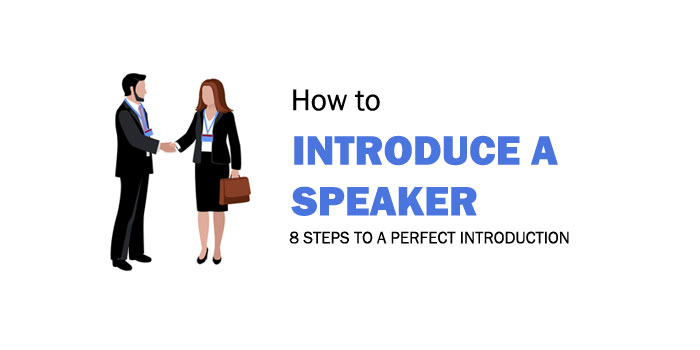
Have you ever noticed the energy in the room after a powerful introduction of the speaker?
Knowing how to introduce a speaker can establish a great starting point for the presenter and boost the audience's enthusiasm for the speaker and the topic.
An introduction that lacks passion and is full of cliche biographical details and exaggerations fails to create momentum.
Hence, a presenter must introduce their speaker in the best way possible. It is your responsibility as the host, MC (master of ceremonies) , or presenter to establish the speaker's credibility through a carefully written and skillfully executed introduction.
Fortunately, crafting a well-thought-out introduction isn't difficult.
Furthermore, it gets progressively easier as you flex your presenter skills , and soon, you might be able to roll a smooth introduction off the tip of your tongue. But first, here are some steps to guide you.
8 Essential Steps of Introducing a Speaker
These tips will help you to understand how to give an engaging speaker introduction that will captivate your audience.
1. Make the Introduction Engaging
The speaker is important, but the audience is equally important and is an even higher priority. The audience needs to have a reason to listen to the speaker.
They need to understand why the speaker is the authority and why their words are worth their time. The presenter's introductory approach significantly impacts the audience's decision to look up and pay attention or zone out.
Why should your audience be excited if you, the host, are not excited to introduce your guest speaker?
The MC is primarily responsible for drawing in the audience and piquing their interest in the speaker. Therefore, the use of clichéd sentences is one thing you, as an MC, should entirely avoid doing.
"Good day" and "My guest speaker needs no introduction" are all uninteresting and outdated sentences.

Also, you should actively introduce and personalize the speaker instead of just reading their biography.
Try to bring them closer to the audience and topic. Remember that for most audience members, that speaker is just a name in the event program. Making the speaker more relatable may help pique their interest.
Ideally, the introduction shouldn't be more than three minutes. Try to grab the audience's attention in the first 30 seconds . Even if the presenter is a well-known figure like Elon Musk or Bill Gates, the audience will begin to droop if the MC fails to keep them engaged.
Furthermore, you need to make the introduction of the guest speaker as simple as possible and in easy-to-understand language , even if the presentation is technical. Let the guest speaker handle the technical part.
2. Do Your Research About the Speaker
This is crucial when preparing to introduce a speaker or host an event. If you haven't researched the speaker(s), you'll be left with woefully little to speak on.
You may be stuck repeating the short bio or a few achievements you've gleaned from the program. Not only would this irritate the audience, but it may also affect the speaker's confidence.
If you are an MC and you are going to introduce a guest speaker, you should know why the speaker is speaking, be aware of the event's purpose, the organizers' goals, and the guest speaker's qualifications.
Most significantly, you should know how the audience will benefit from the presentation. When you can respond to most general inquiries about the speaker, you have already completed the first step in creating a good introduction.
Usually, you can find enough information on your speaker online.
However, if you require additional information not offered online, you could contact the speaker and find out what they want to be highlighted. The guest speaker may even give you a prepared introduction.
3. Practice the Introduction
It may seem like introducing a speaker is something you can muddle through if you have a good memory, but that's not enough. There are fine details that require practice and polishing to deliver an excellent introduction.
Here's an example. Some speakers may have unique names that might be difficult to pronounce for those unfamiliar with the pronunciation .
Saying it wrong can be disrespectful at least and offensive at most. Practicing your introduction will allow you to rehearse the pronunciation till you can say it easily.
You owe it to the person you are introducing and your audience to make your brief introduction engaging. Make it seem like a great honor to present this speaker. You'll need to practice consistently to do all this while sounding natural.
4. Maintain Confidence and Positive Body Language
As one of the oldest forms of communication, body language still serves us today. Your body language is half of your introduction.
If your body language while introducing a guest speaker is not confident and engaging enough, you'll come across as nervous and jittery and distract the audience from your words.
Speak informally , as you would to friends. A smile might also be an inviting sign of warmth to the audience.

While you don't necessarily need to tell jokes when presenting a speaker, you must feel at ease on the podium and come across as confident. You should captivate the listener with your tone , language, and speaking style.
A general rule is that the first 30 seconds of a talk or presentation is when an audience's opinion of the speaker is mainly formed. You can start those thirty seconds off right by having a solid introduction and the correct body language.
5. Establish the Speaker's Qualifications
Consider why the audience would want to attend the seminar or presentation. Did the audience come for the guest speaker? Or did they come to the event because of the topic of the presentation?
Most of the time, the topic of the presentation draws the audience to the seminar. However, there are instances where the whole event is focused on one speaker.
In such a case, many audience members may be more interested in the speaker than in the event. You need to ensure you're aware of the audience's goals.
No matter the situation, you need to be able to assure the audience that the speaker has the qualifications to provide input on the topic.
You can do that by expanding on the experience and achievements of the speaker. Also, add details of what the audience can expect to learn or discover to increase their interest.

Let's use an illustration to clarify further. Imagine a symposium on artificial intelligence, and Andrew G, a computer scientist and businessman specializing in machine learning and AI, is the main speaker.
You need to share Andrew's qualifications and experience to assure the audience that he has the knowledge to teach them.
To satisfy your audience, a great way to introduce Andrew G would be to mention his books on AI and his research.
What unique perspective does he have to share, and how does that align with the event's purpose or the organization? You can even share a quote from his writings if you so choose.
All these will help the audience understand that the guest speaker is an authority on the subject. They may also realize that the guest speaker has different and unconventional ideas to share about the topic.
6. Keep It Brief
Your introduction shouldn't include a lengthy rundown of the speaker's successes, honors, and experiences. The audience can find a list of some of these in the program handouts . Additionally, it shouldn't be a presentation synopsis.
Don't pile on flattery. Overly effusive compliments about the speaker can give rise to unreasonable expectations. So keep it simple and realistic.
The host should reveal nothing that might embarrass or distract the audience from the speaker's presentation. Always keep in mind that the guest speaker—not the MC—is what the audience is there to hear.
7. Get to Know the Speaker
If you aren't enthusiastic about introducing the guest speaker, you won't be able to hold the audience's attention.
You may get to know the guest speaker better by introducing yourself and interacting with them before the event. There are differences between learning about someone online and meeting them in person.
Some of the details you learn by interacting with the speaker can make them more personable to you and, therefore, easier to introduce.
Not only that, it will impress the speaker if they're so welcome. The speaker would be confident that the audience and the event planners were genuinely interested in his speech and viewpoint.
You can first find out more about the speaker online to discuss things you may have in common. Also, you can chat about the topic of the presentation with them.
Not only can this help you better introduce the speaker, but you might even make an acquaintance, if not a friend.
8. TIS Formula
A good introduction should excite the audience about listening to the guest speaker. Interestingly, successful introducers apply a formula while introducing the guest speaker. It's called the TIS formula.
What is TIS? Let's have a look!
T: stands for Topic
I: stands for Important
S: stands for Speaker
To apply this formula, you must include these three crucial inquiries in your introduction:
What's the topic?
Why is this topic significant to the audience?
What qualifies the speaker to give this speech?
By considering these three questions and making them a structure of your introduction, you can increase the speaker's credibility and give the audience a reason to listen .
We are confident that if you follow the above guidelines and consistently practice, you won't ever need to inquire how to introduce a presenter again.
Now, let's now address what you should steer clear of when introducing a speaker.
9. POETTS Formula for Toastmasters
If you're introducing someone in a Toastmasters meeting , then use the POETTS formula.
P – Project Title of the speech
O – Objectives of the speech (you may call upon the evaluator to read this out)
E – evaluator : who is the evaluator of this speech
T – Time allocated for the speech
T – Title of the speech to be given
S – Speaker’s introduction
Using this formula helps the Toastmaster of the Day to be consistent when introducing every speaker.
Things to Avoid While Introducing a Speaker
Here are some things you should always try to avoid when introducing a speaker.
Never joke around. There are no situations that permit comedy in an introduction speech. Plus, it can draw attention from the speaker to yourself, which is never the goal. Especially never mention anything that can cause embarrassment to the speaker.
The introduction shouldn't appear as though you are reading the speaker's resume or biography. It shouldn't be an overstatement of his accomplishments, either.
Don't use a cliché. Statements like "This woman needs no introduction," or other clichés sound wordy or awkward. If the speaker needed no introduction, you wouldn't have a role in that event.
If you have personal or professional links with the speaker, keep them to yourself because the audience will interpret them as the introducer's prejudiced viewpoint.
Keep the introduction to no more than three minutes . Make it as brief as you can. Lengthy introductions sound like speeches and can reduce the audience's enthusiasm for the speaker.
During the introduction, keep your eyes on the audience rather than the speaker. Additionally, avoid seeming like you are reciting the introduction off a paper. Observe the crowd and make eye contact . Just before the introduction is through, turn to face the speaker.
Do not—absolutely do not—mispronounce the speaker's name. Not only is it disrespectful, but it could hurt your credibility and reputation as an introducer or host.
Give the audience a sneak peek of what they will learn and why they should pay attention without giving away too much about the guest speaker.
The introducer shouldn't try to overshadow the speaker by drawing attention to themselves. Remember, you are an introducer, not a celebrity or a star.
Conclusion: How to Introduce a Speaker
Knowing how to introduce a keynote speaker isn't rocket science. The role of an introducer is to simultaneously engage the guest speaker and audience while conveying to both parties that they are welcome at the event.
Just keep it straightforward and sincere, and be confident. Keep in mind that dull introductions are lengthy. Nobody shows up to an event to hear the introducer ramble. Follow the steps above, and you'll become a master of introductions in no time.
You might also like: How to Introduce Yourself in a Presentation with 6 Terrific Tips

Cart – Checkout
How to introduce a speaker — the art of giving (and receiving) a great introduction.

A good introduction is essential to get a speaker off to a good start. The tendency for event hosts to go casual and say a few non-substantive words — or worse, to try to make a joke at the speaker’s expense — hurts both the speaker and the meeting. Here’s why, and how to give a good intro that will help the speaker — and the event — succeed.
Audiences want several things from a speaker, and some of them right away. First, audiences begin by asking why — why should I pay attention? Why should I care? Why is this going to be important to me? If a speaker is successful, the audience will start asking how — how do I get started? How do I make this my own? That’s success for a speaker — moving the audience from why to how.
Second, audiences test speakers for a few things: trust, credibility, likability. On these items, they’ll give a speaker a little time, but they make unconscious decisions very quickly, and those unconscious decisions are hard to turn around. So it’s better to get it right from the start.
That’s where the introduction comes in. An introduction can help answer the why question. And an introduction can help establish credibility, especially, but also trust and likability. The result of a good introduction is to greatly increase the likelihood that the speaker will do well. At least, she’s off to a good start.
A good introduction should answer 3 questions
A good introduction should answer 3 questions: why this speaker, on this subject, to this audience? A little humor is permitted, but an introduction should never denigrate the speaker, even in fun. The idea is to build the speaker up in the audience’s mind.
As an example, here’s a short introduction I provide for my own speaking engagements
Here at XXXXXXX, we live and die by our communications successes and failures. So it is with special excitement that I’m pleased to welcome Dr. Nick Morgan to our annual gathering. Nick is one of America’s top communication theorists and coaches. He has coached people to give Congressional testimony, to appear on the Today Show, and to take on the investment community. His latest book, Trust Me: Four Steps to Authenticity and Charisma , was published by Jossey-Bass last year. And he has one of the best blogs on communications.
Have you ever wondered why you can’t take your eyes off some charismatic public figures, while others put you immediately to sleep? Nick is going to demystify charisma and storytelling for us today, giving us lots of practical ideas we can immediately put to work when we’re back in the office on Monday…
Please join me in welcoming Dr. Nick Morgan!
I’ve often noted that a celebrity speaker can be mediocre and yet the audience can report that it had a good time. The reason is that the celebrity has already been ‘introduced’ to the audience — the audience knows the celebrity by advance reputation. The work of a good introduction is to raise the speaker to celebrity status for the purposes of that occasion.
Always end with an applause line for the speaker — “so please join me in welcoming Jane Doe!” — to allow her time to get up on the stage and ready to go. And it’s a very good idea to shake the speaker’s hand as he or she goes by on the way to the lectern. Shaking another person’s hand is grounding and comforting, and will help the speaker get off to a good start.
In terms of body language, the handshake gives the audience the sense that it has met the speaker close up, because a good introducer is the representative of the audience. So when the speaker and introducer shake hands, a bond is formed with everyone.
So don’t neglect the introduction.
It’s up to the speaker to prepare a good introduction
And speakers, prepare a good one. Don’t assume that the folks in charge will have a credible intro ready to go. Make it easy for them and write it yourself. You need the boost so that you can show up in front of that audience with credibility, trust, and likability.
Without a carefully prepared script, here’s what can go wrong. At best, the person introducing you, blandly reads your your bio that she’s printed from your web site. At worst, you get introduced by an enthusiastic ad-libber, and he starts by saying, “I’m not going to read the intro they sent me.” He adds some irrelevant comments about how he met you the evening before over the Spilled Bloody Mary Incident (his fault, not yours). What’s supposed to be charming self-deprecating humor is awkward and goes on too long. The rest of the introduction gets lost in the verbal shuffle, and the host gets key facts wrong, stumbling over the sentence structure and some unfamiliar words. He leaves out mention of your book, and ends with another half-hearted attempt at humor. You walk on stage to the sound of a lot of single hands clapping.
If you want to avoid this sort of disastrous incident and be guaranteed to get your speech off to the best possible start every time, create a DVD intro that showcases you and your history with some drama and excitement. The video will put you in the best possible light and get the audience keyed up to see you. You can do this in a carefully scripted 3-minute video, and the cost can be quite reasonable. In any case you should mentally amortize the cost over all the introductions that won’t be botched from here on.
What should go into those 3 minutes? Answer the question why? Why are you cool, why is your speech important, why should the audience care. Give a few salient details about your accomplishments, and end with the music amped up and the cheers already rolling in. Have the last words of the voice over be, “Ladies and Gentlemen, please welcome (You)!” and the applause will follow naturally. The great thing about video (with a compelling soundtrack) is that it can touch the emotions in a way that’s much harder for your host to do, statistically speaking.
It’s all about quality control. Create your own intro video and you’ll never have to suffer a botched intro again. Get the intro right, and the speech is half done.

Share This Story, Choose Your Platform!
About the author: nick morgan.
Related Posts

56 Comments
I am presenting a workshop to our employee self-help group at the Social Security Administration next week. The topic will be: “How to be a better meeting participant & take better notes”. They asked me for my bio. It is usually is read or paraphrased as an introduction. I have never been happy with the “Read the Bio” approach, but couldn’t elaborate a better method. I will share your posting with our core group so that the speaker introductions are more effective for the participants.
Your information eloquently states exactly what I want to hear from a speaker introduction and makes my job of writing up my own much easier!
Nancy, thanks for the comment and good luck with the event!
[…] Helpful Resources How to introduce a speaker — the art of giving (and receiving) a … […]
Nick……3 years later and your writing is still helping others. this is a fab piece, thank you!!!
I agree 3 minutes tops to introduce a speaker or anyone, a band, etc. and the introduction should not be read the audience came to see the band, speaker, etc. not the introducer
Love this! Doing my first speech and wanted to really nail and introduction knowing it could put me on good footing to start. I appreciate you writing and sharing this Nick.
Good luck, Thomas, and thanks for the comment!
I was asked to be an MC recently on a graduation ceremony for the first time in my life and truly speaking, this article comes to my rescue. Thanks so much Nick.
Great to hear — good luck, Joram!
I am going to be the master of ceremony on a graduation party for the 1st time today. Hopping these tips will help me a lot…I thank u so much.
From Duds wait
How can we write a good introduction for for a TED event speaker but is still in High School? (meaning s/he did not achieve much professionally or does not have much experience)
Talk about her enthusiasm, energy, vision — the things that great high school students have in abundance. An intro doesn’t have to be a resume — in fact it shouldn’t be.
thanks nick for all that information.. i think im ready to go and nail it this Friday!!!!
Break a leg!
Thank you! This was helpful to me in introducing a major artist at an upcoming event.
Thanks, Clara, for the comment. Glad it was helpful.
Thanks a lot for the useful tips, I am going to introduce my book in church.
You’re welcome — good luck with the introduction!
I am going to be MC at a graduation.. need help on how to introduce speakers
Search MC on our site and you’ll find some posts on how to do that well.
Thank you! This is very helpful for a first-time intro writer!
Thanks, Gretchen, and good luck!
Do you need to introduce a person in by their profession? Like this is Engineer Sam or this is Architect Sam? How about the teachers, do we need to introduce them as Teacher Sam? I just want to know because some people I know introduce them by their profession. And when do we need to use their profession.
Hi, Dennis —
An introduction answers several questions for the audience: why this person, why this topic, why this audience, why now. The speaker’s profession is almost always included in that answer. Not always (imagine someone talking about being a recovering alcoholic, for instance), but almost always.
Hello Sir Nick, I am invited to speak on a graduation day.. can i ask for a nice idea on how the they will introduce me on that day ..i want a very short introduction.. How i am going to start?
Yes, ask yourself, what is the one thing in my work that I am most passionate about? Then, get the introducer to tell a brief story that illustrates that passionate expertise. When you go on stage, then, be ready to talk about a related subject, since you will now appear to be expert in that area, thanks to the intro.
Woman’s Club meeting. Program within meeting. Who introduces program? Vp in charge of programs or chairman of the program?
Either one can; depends on VIP status of speakers. If more important, Chairman. If less important, VP is fine.
What exactly are you waiting for? And who does the thank you
The same person who does the intro should do the thanks.
Hi mike, Can i ask for a basic script to intoduce a physicians and profisors in a ceremony , i have asked to be MC for the first time on my life, my event will be held on the next sunday Oct 15-2017
Thank you in advance. Aisha.
Hi, Aisha – each introduction is different — that’s the whole point of them. For a basic outline, answer the following questions: (1) Who is the person (what have they accomplished that’s relevant to this audience?); (2) What is their area of expertise (that is relevant to the audience?); (3) why is the topic (and the speaker) important right now?. Always end with the speaker’s name.
Hi Dr. Nick,
I have been told to introduce a few couple of Physicians at a Conference. It is a medical conference and the audience are also physicians. I have been given the CV of speakers and I need to highlight their expertise, experience and accomplishments.
Any Tips, Please?
1. Don’t read the CV. Just give highlights in the form of a story relevant to the audience. 2. Ask the speakers for a human detail or story or two. 3. Tell the audience why this speaker is important to this audience today.
As I am a TMOD of the meeting. How do I introduce a word and a thought master? Please help as this is my first time and I don’t want to screw this.
Start with why this person is so impressive — what wows you about him or her. Say a few words about what the topic is and why it’s relevant to the audience. And then explain why now is a particularly good time to hear from this speaker. End with the speaker’s name, and start the applause.
Hello Sir Morgan,
Today I learnt that speech of introduction is equally important to the actual speech by the speaker. Thank you for the wonderful tips. It’s useful for my Speech course at my university.
Thanks, Inba.
Good morning Mr. Morgan; Can this introduction be used for a sermon introduction as well? How can I include their character and love to teach and share ministry into this introduction ? I am new at this and really want to do a good job. The topic is on family Reunion and this person is a minister in the family.
Hi, Trina — yes, you certainly can use the general structure here for a sermon introduction. You would include the details you mention under the heading of “why this person,” because the character, love to teach, and share ministry are presumably all good reasons for this person to speak. Hope that helps.
I’M ASKED TO INTRODUCE A PARAMOUNT CHIEF TO CHAIR AN OCCASION. THIS WILL HELP ME.
[…] were reviewing the stats on this blog recently, and one of the surprising numbers is that the blog post that consistently gets the most views is one I did over a half-dozen years ago on how to introduce a speaker. I suppose that’s where […]
Nick, This is a great resource for students in public speaking courses. You inadvertently have help hundreds of students get good reviews and great grades.
Shawn, that’s a good thing, right?
Hey nick, I have to welcome series of speakers and I really dont want to end with “Lets welcome him/her with huge round of applause”. ao, can you put out the alternatives for “to present his/her speech”. Thanks much for the article, btw.
Hi, Prithak — If I understand your question, it’s how to end each introduction? You should always end with the person’s name, as a trigger for the applause: “Please welcome James Blunt!” Don’t vary that formula. The variation comes in what you say about the person before the ending of each introduction.
Thanks for mentioning how they need to provide a good introduction. Having someone that is prepared can be nice. Choosing a good master of the ceremony could help a lot.
This is really amazing. It’s a very grateful blog for me. Thanks for sharing it.
This is an amazing article that I found through Brian Dodd. This will help me to help the speaker when we have special ministries come to our church.
Thank you, Sis, for the article, it was very helpful and I got new insight. I really appreciate it, I hope you are given health so that you can continue to write useful articles like this.
Thanks for sharing it, its really amazing
Youth conference speaker significantly impacts the youth listening and attending the conference, so it has to be motivational and inspirational. In this connection, the speaker should be reliable and trustworthy. Audiences expect various things from a speaker, some of which they wish for immediately if a speaker succeeds.
I’m introducing my daughter as Mother’s Day speak at my church on Sunday. Please give me some tips on how to introduce her She’s a great mother for over 20 years 30 years. She has to find boys Christian boys and she’s a great speaker.
Good introductions are short, and answer 3 questions: Who, what, why. Who is this speaker (very brief relevant bio); what is her subject mater that she is going to talk about; and why is she uniquely qualified to talk to this audience?
Great job, this blog is very informative. Thank you
Leave A Comment Cancel reply

Public Speaking Podcast
A podcast launched in a time of great change. Just One Question with Dr Nick Morgan has over 50 episodes featuring some of the worlds most elite and accomplished speakers. More importantly the podcast brings light to our industry as we undergo a public speaking and communication reformation.

© Copyright 2021 | All Rights Reserved Public Words Inc | Legal | Privacy
BLOG PODCAST NEWS SUBSCRIBE
Sign up to our weekly blog for useful articles, tips and podcasts for boosting your public speaking career:
CALL US NOW
© Copyright 2021 | All Rights Reserved Public Words Inc | Legal Policy | Privacy Policy
- School Speeches
- Introductory Speech
- Anniversaries
- Funeral Speeches
- Graduation Speech
- Persuasive Speech
- Wedding Speech
- Speech Tips
- Special Days
- Speech Topics
- Demonstrative
- About Author
- Privacy Policy
Sample Introductory Speeches - Setting The Tone
Sample introductory speeches don't come better than an introductory speech for Usain Bolt.

Wow! Who will ever forget his moment of glory as he did his victory lap after winning 3 golds and smashing world records at the Olympics?
Take a look, read, adapt and in record breaking speed you'll have a great speech.
INTRODUCTORY SPEECH - USAIN BOLT
Good morning Ladies and Gentlemen,
It is both and honor and a privilege to be able to introduce you to a role model of note, a man of distinction - Usain bolt.
Usain Bolt is a Jamaican sprinter and he was born on 21st of August 1986.
Usain has distinguished himself as a world class sprinter and he holds the Olympic and World Records for the 100 meters in 9.69 seconds and the 200 meters in 19.30 seconds. Usain has taken his level of excellence one step further - and together with his teammates - he also won the 4X100 meters relay in the amazing time of 37.10 seconds.
What makes Usain's achievements all the more remarkable is the fact that they were all set at the 2008 Summer Olympics. Usain became the first man to win all three events at a single Olympics since Carl Lewis in 1984 and the fist man in history to set world records in all three events at a single Olympics. His name and his achievements in sprinting have earned him the media nickname "Lightning Bolt".
I am sure that you all know a great deal about his public sprinting life, but there is more to Usain than just running.
Sidebar: great sample introductory speeches always show the speaker's human side too.
Usain enjoys dancing and he is often described as a laid-back and relaxed character. The first sport to interest him was cricket and he said that if he was not a sprinter, he would be a fast bowler instead. He is a fan of Sachin Tendulkar, Chris Gayle and Matthew Hayden.
Ladies and Gentlemen, I'm sure you will agree that the world of cricket has lost out - but the world of sprinting has gained a legendary role-model.
Please join me in welcoming Usain Bolt to address you this morning with his words of wisdom.
Our sample introductory speeches are based on less-is-more. Your introduction speech should welcome and honor your guest speaker, not steal their limelight.


How to Write a Commencement Speech as a Guest Speaker (Ideas, Tips, Examples)
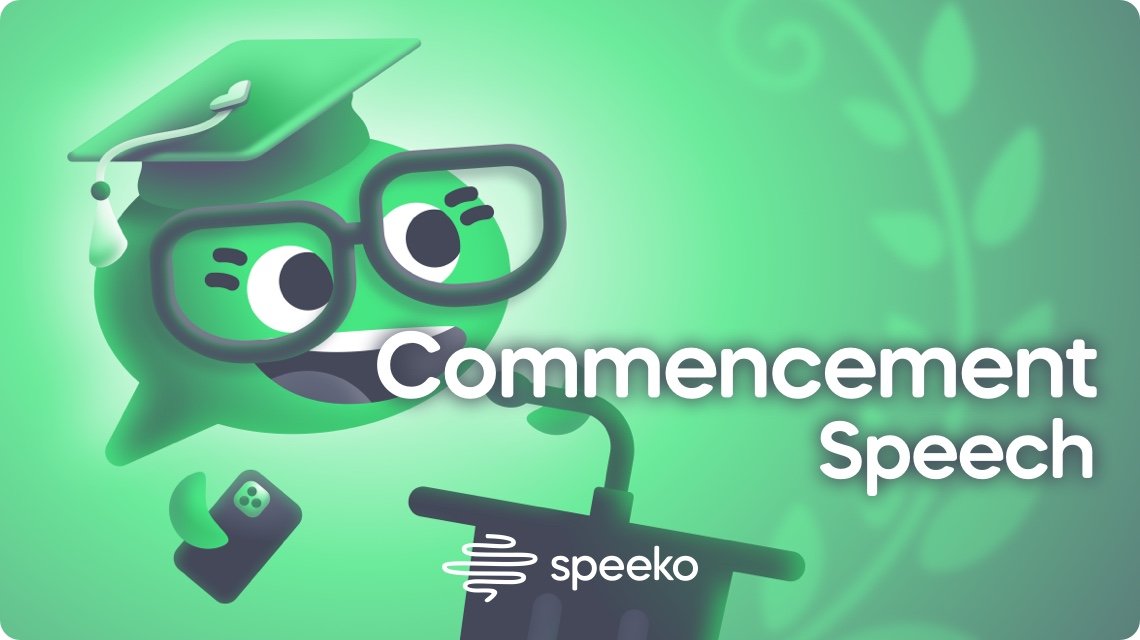
Download Speeko (iOS/macOS) to start our Graduation Speeches course for free!
Have you found yourself in the exhilarating position of being chosen to give the keynote speech at a graduation ceremony?
Picture this: The campus is abuzz with activity, and families and friends are flocking in from far and wide. It’s a reunion like no other, where loved ones meet classmates and faculty, celebrating connections that will last a lifetime. It’s a moment of joy, of celebration, and yes, a tad bittersweet, as it marks the end of the graduates’ time in this hallowed institution.
And soon, you’ll be at that podium, delivering the keynote address. What an honor! It means you’re a shining star in your field, highly respected and admired. You’ve been entrusted with the task of inspiring these eager minds before you.
Take these suggestions as friendly advice based on my observations of over 50 commencement speeches. These tips will guide you in crafting an original, inspiring, and memorable commencement speech. They aren’t set in stone or meant to limit your approach to speechwriting. Instead, think of them as a springboard to craft your own unique and captivating address.
👉 3 commencement speech examples
How do I structure the content of my commencement speech?
Use the Past-Present-Future framework as your guide. This is a great starting point, and feel free to play around with this outline as you develop your speech.
Theme: What’s the main message that ties your speech together? If the graduation already has a theme, include it.
Opening: Thank the people who invited you to speak. Introduce yourself.
Key Idea 1: (Past) Share stories and observations from your journey and the graduates’ journeys.
Key Idea 2: (Present) Give 3 pieces of advice.
Key Idea 3: (Future) Frame your advice in the broader context of the graduates’ futures.
Closing: Give a call to action. Tie it back to your theme.
💡 Pro tip: Your graduation speech should include at least 1 or 2 stories. Stories will make your speech personal and engaging.
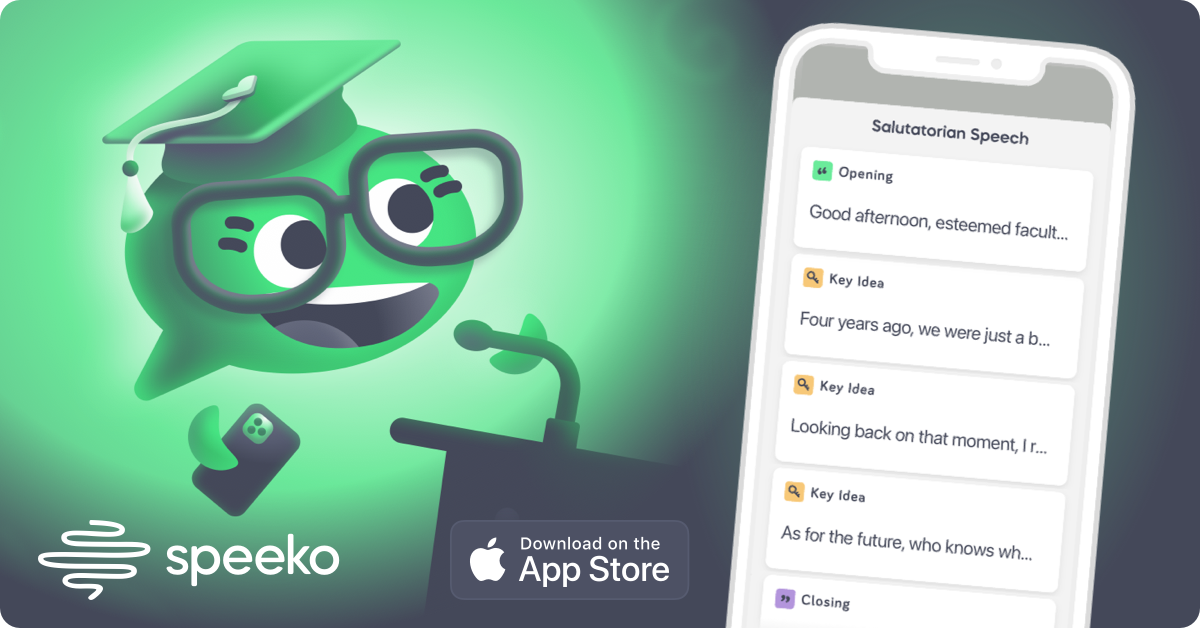
Download Speeko (iOS/macOS) to draft notecards and get A.I. feedback on your commencement speech.
How can I make sure my commencement speech resonates with my audience?
Imagine a colorful tapestry of people gathered before you. We have the graduates, bright-eyed and ready to conquer the world. We have their loved ones bursting with pride and joy. Then there are the staff, faculty members, and administrators, all dedicated to nurturing minds and shaping futures.
Here’s the deal: This speech isn’t about you. Nope! It’s about the graduates and their guests. It’s a moment to honor the accomplishments made by these remarkable individuals and their loved ones. It’s not the time to spotlight your own achievements or use it as a platform for self-promotion.
Ask yourself these questions:
Who is my audience? What are their backgrounds? What are their identities? Why are they here?
What would make my talk worthwhile for them?
Why would they care about me and my journey?
If they don’t know who I am, what would make them feel connected to me?
That’s not to say you can’t talk about your accomplishments. In fact, your audience is expecting to hear about those! The key is to frame your achievements in ways that provide value to your audience. For example, if you’ve written a best-selling book, you can ask yourself: Why would my audience care that I accomplished this? What struggles of mine can they relate to? What lessons can they apply to their own lives?
How long should my commencement speech be?
The length of a commencement speech can vary depending on the ceremony.
As a general rule of thumb, aim for a speech that’s 10 to 15 minutes long.
Give yourself enough time to cover all the main ideas you want to share. At the same time, make it short enough so you don’t bore or tire your audience. Finding that sweet spot is key.
💡 Pro tip: Time your speech beforehand. And don’t just do it once. Rehearse it several times to make sure it flows smoothly and fits within the time limit. That way, you can go into the graduation ceremony with the confidence of knowing you’ve got this speech thing down pat.
How can I make my commencement speech memorable?
Let’s talk about how to make your commencement speech memorable.
Connect with your audience: Talk to the graduates on a personal level. Use language they can understand easily. Talk about what motivates or concerns them. Use relatable examples. Lead with emotion. Use the “you.”
Think tweets: Make your messages bite-size. Craft your sentences so they’re easy for someone to share on social media.
Share a story: Stories are powerful tools to capture the attention and emotions of your audience. Recount a personal anecdote that your audience can relate to. Try to surprise them.
Use humor: Humor can be a great way to lighten the mood and make your speech more enjoyable. Use appropriate humor.
Share a quote: Quotes are a great way to add wisdom and inspiration to your speech. Use a quote from a famous person, book, or movie that highlights your message and that your audience can remember. This can help reinforce your theme and make it more motivational.
What are some tips for delivering a successful commencement speech?
Delivering a great commencement speech requires a bit of preparation and practice. Here are some tips to help you nail your delivery:
Prepare in advance: Don’t procrastinate! Write it down, rehearse it several times, and time it to ensure it fits within the time limit. Use feedback from others to improve your speech.
Speak clearly and slowly: Avoid mumbling or jumbling words. Keep your chin up, speak slowly enough for people to understand you, and use pauses to highlight important words.
Use your body: Your body language can add oomph to your speech. Use your hands, face, and posture to help express your emotions and message. And don’t forget to make eye contact to connect with your audience!
Manage your nerves: It’s normal to be a little jittery before speaking, but try to relax by taking deep breaths, visualizing yourself rocking the speech, and remembering that your audience is rooting for you to succeed.
Use the “you”: When you use “you,” “we,” and “us,” you invite your audience into your speech. It’s a simple technique, and it makes a powerful difference. So when you review a draft of your speech, look for how to use “you” as often as possible.
Be yourself: Don’t try to be someone you’re not. Speak from the heart, stay true to your values, and let your personality shine through. Remember, you’re the guest speaker for a reason!

Download Speeko (iOS/macOS) to get A.I. feedback on your speaking style.
How can I make my commencement speech meaningful?
Creating a meaningful commencement speech is all about being true to yourself and connecting with your audience. Here are some tips to make your speech meaningful:
Stay positive: Focus on the good things about your journey. Encourage people to chase their dreams and make a difference in the world. No need to be mean or snarky, even toward your nemeses and naysayers. Keep it respectful.
Be inclusive: Use language that is inclusive and respectful to all members of your audience. Avoid stereotypes based on gender, age, or cultural background.
Show empathy: Tap into the graduates’ experiences and emotions. What would they want to hear about? What would make your speech meaningful to them? Share stories that resonate with them and show that you care about their perspective. Use emotional language to really connect with them. It can be as simple as naming the emotion: “I’m sure you’re just like I was at your age and anxious about what’s to come…” or “I know you’ve all been through a lot to get here….”
What should I avoid when writing a valedictorian speech?
Some common mistakes can detract from your message.
Avoid sugarcoating: Yes, life can be serendipitous and magical, and it’s important to paint an optimistic picture. But what will make people really invested in your speech is honesty and candidness about obstacles you’ve faced. Just think of your favorite movie or T.V. show—there are always hardships and setbacks. Reassure the graduates that they don’t need to win every contest or have good fortune all the time.
Avoid clichés: Steer clear of overused phrases that don’t have any originality or authenticity to them. Use your own words to share your message.
Avoid arrogance: Stay humble. You don’t want to come across as egotistic or condescending when talking about your achievements or your classmates. Keep a humble and respectful tone that shows gratitude and appreciation.
Avoid controversial topics: You don’t want to discuss anything that might offend or divide your audience. Keep things upbeat and inspiring so that everyone can relate to your message.
Avoid sensitive language: Don’t use inappropriate language, jokes, or stories that could offend or embarrass anyone in your audience. Keep things respectful and appropriate for all ages and backgrounds.
Avoid rambling: We all appreciate speakers who carefully choose their words, get straight to the point, and conclude with a flourish.
Avoid jargon: Don’t get lost in technicalities. A touch of history or technical detail can be helpful to illustrate a point, but too much can blur your message.
Avoid making fun of other people: Strike a balance between gravity and levity. You can poke fun at yourself, but be careful about poking fun at others. You don’t want to put people down. Even if your intent is good-natured, your message might not be received that way.
What are some creative ways to start a commencement speech?
When it comes to writing the opening of your commencement speech, it can be challenging to set the tone for the rest of your speech. But don’t worry. Here are some creative ways to get you started:
Share a quote: You can start your speech with a powerful quote that relates to your message and sticks in the graduates’ minds.
Use humor: Start with a funny story, joke, or pun related to the graduation. You can include a few jokes. Just be careful not to go overboard with the humor.
Tell a story: Share a personal story. It can be from your earlier years or even just last week!
Ask a rhetorical question: Start your speech with a rhetorical question that prompts your classmates to think about your message and engages them.
Use a metaphor: Introduce some symbolism that relates to your message and paints a vivid picture.
What are some topics to discuss in a commencement speech?
Choosing a theme for your commencement speech can be a real head-scratcher. The key is to weave stories into your speech. Stories that are specific and colorful will keep your audience engaged and entertained. Let’s take a look at some possible themes:
Gratitude: Think of someone who had a life-altering influence on your journey—maybe a mentor, family member, or friend—and share a story about them. You can even reveal a little “secret” about this person you think the audience should know. This will give your speech a more intimate feel.
Cherished memories: Ah, memories. They can be a great way to connect with your audience. Share meaningful memories from times you and your audience have shared, such as major world events or holidays. Try to find a common theme among those memories that can become the theme for your entire speech.
Achievements: As the guest speaker, you’ve achieved a lot, as have the graduates. So why not celebrate those achievements and reflect on the hard work, dedication, and perseverance that led you all to this moment? Use your journey as an example, and inspire the graduates to continue pursuing their achievements.
Change: Reflect on the changes and challenges you or the graduates have faced during your journeys. For example, how has the pandemic impacted you and the graduates? Or how did major advances in technology bring people closer together?
The future: Share your aspirations and goals, and encourage the graduates to pursue their dreams and positively impact the world. This will be a nice contrast to the stories you tell about the past.
What is the best way to end a commencement speech?
Ending a commencement speech is just as important as starting it. The conclusion should leave a lasting impression on your audience and end on a high note. Here are ways you can end your speech:
Tie it back to your theme: Take a moment to summarize your key ideas and highlight the key takeaways of your speech. This will help reinforce your message and ensure that your audience remembers it.
Use humor: End your speech with a lighthearted joke or pun that leaves your audience smiling and wraps up your message nicely.
Express gratitude: Take a moment to thank people who have supported your graduates throughout their journeys. Showing appreciation can create an uplifting ending to your speech.
Encourage action: Inspire your audience to take action based on your message. Encourage people to pursue their passions or make a positive impact.
Share a quote: End your speech with a powerful quote that relates to your message and that your audience can remember. Leave people with a thought-provoking idea.
💡 Pro tip: In the closing of your speech, avoid thanking people from your own life or putting the spotlight on yourself. At this point in your speech, people are ready for it to end, and they’ll disengage if you continue talking about yourself.
How can I find inspiration for my commencement speech?
Finding inspiration for your commencement speech can be challenging, but there are many ways to get inspired. Here are some tips:
Reflect on your experiences: Look back at your journey, and think about the moments that made a real impact on you. Your personal experiences, thoughts, and values are all great sources of inspiration.
Just start writing! Grab your phone (or a pen and paper) and jot down all the ideas that come to your mind, no matter how silly or impossible they seem. You never know—one of those ideas could become a great speech!
Talk to people: Bouncing your ideas off others is always good. Talk to your family, friends, and mentors for their perspectives and insights. They may have valuable ideas and feedback to help you shape your speech.
Research: Listen to other commencement and inspirational speeches to get some ideas. Reflect on what works and what doesn’t.
And don’t forget to have fun with it! This is your moment to shine, so enjoy it and make the most of it. Good luck!

Download Speeko (iOS/macOS) to brainstorm stories for your commencement speech.
🎬 Example 1
Theme: Writing your own story
Opening: Good morning, esteemed faculty, honored guests, and most importantly, the incredible graduates of this extraordinary institution. I am deeply honored to stand before you today as your commencement speaker. I want to express my sincere gratitude to the organizers for this incredible opportunity. My name is [Name], and I have had the privilege of leading one of the most iconic entertainment companies in the world. But today, I’m not here as a CEO; I’m here as a fellow traveler on the journey of life, eager to share my experiences and insights with all of you.
Key Idea 1: (Past) As we gather here today, each of us brings a unique story. My own journey has been one of constant change, and I’m sure many of you can relate. Life rarely follows a straight path, and it’s in those unexpected detours that we often find our greatest growth. I remember facing numerous challenges and setbacks along the way, but it was through those trials that I discovered my resilience and capacity for reinvention.
Let me share a personal story that illustrates the power of embracing change. Early in my career, I found myself working at a struggling television network. The industry was undergoing a seismic shift, with emerging technologies and changing viewer habits reshaping the landscape. It was a time of uncertainty, and many believed that traditional media was on the verge of obsolescence.
Instead of resisting the winds of change, I chose to lean into it. I recognized the potential of emerging platforms and technologies, and I saw an opportunity to redefine the way stories were told and consumed. We took bold risks, embraced digital innovation, and transformed the network into a global entertainment powerhouse. Through perseverance and a willingness to adapt, we not only survived but thrived in the face of disruption.
This experience taught me a valuable lesson: Change is not something to be feared but rather an opportunity for growth and reinvention. Graduates, as you navigate the uncertainties of your own journeys, remember that the most significant rewards often come from embracing the unknown and charting new paths.
I encourage you to reflect on your own journeys. Recall the moments of triumph and the moments of defeat, for both have played an essential role in shaping who you are today. Embrace your past, learn from it, and carry those lessons forward as you embark on this new chapter of your life.
Key Idea 2: (Present) Now, let me share with you three pieces of advice that have served me well in navigating the complexities of the present.
First, embrace change. We live in a rapidly evolving world where innovation and disruption have become the norm. Embracing change allows us to see opportunities where others see obstacles. It’s the willingness to adapt, to challenge the status quo, and to continuously learn that will set you apart.
Second, nurture your relationships. Success is seldom achieved alone. Surround yourself with people who inspire you, push you to grow, and believe in your potential. Throughout my career, I have had the privilege of working with extraordinary individuals who have shaped and influenced my journey. One such person was a mentor who saw potential in me when I doubted myself. This mentor provided guidance, challenged me to stretch beyond my comfort zone, and instilled in me a belief in my abilities. Their belief in me fueled my confidence and propelled me to new heights. It was through their mentorship and the support of countless others that I could overcome obstacles and achieve success. These relationships not only enriched my professional life but also brought immense joy and fulfillment to my personal life.
Third, never stop dreaming. The power of imagination knows no bounds. Dare to dream big, to envision a world that is better, brighter, and more inclusive. It is through audacious dreams that we have seen remarkable progress throughout history. So, be bold in your ambitions, and have the courage to pursue your passions, even when the odds seem stacked against you.
Key Idea 3: (Future) As you look to the future, I urge you to consider your role in shaping it. The world is in dire need of innovative thinkers, compassionate leaders, and advocates for positive change. Each of you has the power to make a difference, to contribute to the betterment of society in your own unique way.
But remember, the journey ahead will not always be smooth. There will be moments of uncertainty, doubt, and fear. Embrace those moments as opportunities for growth. Take risks, learn from failures, and never lose sight of your core values. In a world that often feels divided, let empathy guide your actions and decisions. Seek common ground, build bridges, and work towards creating a more inclusive and equitable future for all.
Closing: I want to leave you with a call to action. Embrace change, nurture relationships, and never stop dreaming. Embody the spirit of curiosity, resilience, and compassion as you go forth and write your own story. Remember, it is in the face of adversity that the most remarkable chapters of our lives are written.
Graduates, the world needs your unique talents, your fresh perspectives, and your unwavering determination. Seize the opportunities that come your way, and remember that even the smallest actions can have a profound impact. Together, let’s build a world where every individual can thrive, where creativity flourishes, and where kindness reigns.
Congratulations, Class of [Graduation Year]! May you find fulfillment and purpose in the pursuit of your dreams. Thank you, and best of luck on your extraordinary journey ahead!
🎸 Example 2
Theme: Resilience
Opening: Thank you so much for having me here today. I have to admit, when I got the call to give this commencement speech, I was like, “Are you sure you’ve got the right [Name]?” But here I am, and I couldn’t be more thrilled to celebrate this incredible milestone with all of you.
Before we dive in, let me introduce myself. I’m [Name], a singer-songwriter, cat enthusiast, and professional overthinker. And today, I’m here to share a few stories and hopefully make you smile, think a few new things, and maybe have a fresh perspective on what’s ahead of you.
Key Idea 1: (Past) Let’s start by thinking about the past. Some of you might have faced challenges and maybe even had a few shake-it-off moments. Trust me, I’ve had my fair share of those too. Back in high school, I was the awkward, nerdy girl with big dreams and even bigger glasses. I remember auditioning for the school musical and completely butchering my audition song. It was a cringe-worthy moment that made me question if I had any talent at all.
But you know what? I didn’t let that failure define me. I dusted myself off, practiced harder, and eventually landed the lead role in the following year’s production. That experience taught me the power of resilience and the importance of pushing through those moments of doubt.
Here’s the thing: Setbacks and failures don’t define you. They’re just pit stops on the road to success.
I also remember when I was just starting out in the music industry. I was rejected by so many record labels. They said I didn’t fit the mold, that I wasn’t marketable. But instead of giving up, I decided to write my own story and create my own mold. And look at where we are now. So, embrace your unique journey and remember that the world needs your originality.
Key Idea 2: (Present) Now, let’s think about where we are today. You’re probably all feeling a little trepidatious about what’s to come. Here are three pieces of advice I want to share with you that will hopefully get you excited about what’s coming.
First, never underestimate the power of staying true to yourself. As many of you know, I’ve been in the spotlight for quite some time, and with that comes a fair share of criticism. I’ve been labeled as too pop, too country, too this, too that. It’s enough to make anyone question their authenticity.
But instead of letting those criticisms bring me down, I chose to embrace my true self and let my music speak for itself. I realized that I couldn’t please everyone, and that’s okay. The moment I stopped trying to fit into other people’s boxes and started being unapologetically me, that’s when everything changed.
Second, surround yourself with people who lift you up. The journey can be harrowing, but it’s a lot more fun when you have a squad by your side. Find your ride-or-dies—your cheerleaders—and keep them close. And hey, if you find a friend who appreciates your puns as much as mine do, you’ve hit the jackpot.
Third, take risks and embrace failure. Yes, failure can be scary. But it’s also a great teacher. My own failures have been some of my biggest blessings in disguise. So, don’t be afraid to step out of your comfort zone, try new things, and learn from your missteps. Remember, it’s not the number of falls that matters but the number of times you get back up.
Key Idea 3: (Future) And finally, let’s think about the future. A little scary, right? You’re about to enter a world filled with endless possibilities. It’s like a blank space waiting to be filled with your dreams and aspirations. But with that comes a lot of uncertainty.
I want to remind you that it’s okay to not have all the answers right now. Life is a series of plot twists, and we can’t always predict what’s around the corner. But that’s where resilience comes in. When life throws you a curveball—and believe me, it will—you have the power to adapt, to rise above, and to come back stronger.
Embrace change, because it’s often in the most unexpected moments that we find our true selves. Your path might take unexpected turns, and that’s okay. Keep your head up, your heart open, and your dancing shoes on, because you never know when a great beat is about to drop.
Closing: So, graduates, as you embark on this exciting new chapter, my call to action for you is simple: Embrace the power of resilience. Remember that setbacks are just setups for comebacks. Embrace your unique journey, work hard, surround yourself with uplifting people, take risks, and never be afraid to get back up after a fall.
And don’t be afraid to let your unique voice and talents shine. Embrace your quirks, celebrate your individuality, and never apologize for being authentically yourself. In a world that’s constantly trying to mold you, be the one who breaks the mold.
In the words of one of my favorite songwriters James Taylor, “The secret of life is enjoying the passage of time.” So, trust in yourself, believe in your dreams, and go out there and write your own beautiful, messy, and extraordinary stories.
Congratulations, Class of [Year]! You’re ready to take on the world, and I can’t wait to see all the incredible things you’ll accomplish. Now go out there and make your mark, because the world is waiting for your magic.
🃏 Example 3
Theme: Embracing the unexpected
Opening: Good evening, and thank you to the faculty, everyone’s loved ones, and—most importantly—the graduates. Thank you for having me here. Wow, I can’t believe I’m standing here today. I mean, I’m just a guy who tells jokes for a living. I’m honored to be here.
Now, if you don’t know who I am, I’m [Name], the host of a show where I get paid to make fun of the news. But tonight, I’m not here to make fun of you, graduates. Well, maybe just a little bit. But my main message for you today is this: Life is like a game of chess, and you are the queens and kings ready to conquer it!
First of all, let’s take a moment to appreciate this incredible milestone in your lives. Graduation is a big deal! It’s the moment when you transition from being a student who occasionally naps in class to an adult who occasionally naps at work. Cherish this moment, because soon you’ll be saying goodbye to ramen noodles and hello to a lifetime of avocado toast.
Key Idea 1: (Past) Each of you has gone through a long and unique journey that has led you to this point. Some of you took the scenic route through multiple majors, while many of you sprinted to the finish line with laser focus. But regardless of your path, remember that life is not a race... unless you’re running from your student loan officer.
I remember when I graduated. I had big dreams of becoming a comedian, but my mom wanted me to be a doctor. So, I compromised and became a comedian who makes jokes about doctors.
When I started hosting my show, I had no experience in political satire or news journalism. I had to dive headfirst into a world that was unfamiliar to me. But that curiosity allowed me to learn, grow, and adapt.
My point is, your journey may not always go as planned. But we embrace the detours, because they often lead us to the most unexpected and rewarding destinations.
Key Idea 2: (Present) I have three big pieces of advice for you today.
First, never be afraid to fail. Failure is like a rite of passage for successful people. Just ask Thomas Edison. He tried and failed a thousand times before inventing the light bulb. Imagine if he had given up after 999 attempts. We’d all be sitting here in the dark, waiting for someone else to brighten our lives. Embrace failure, learn from it, and then fail again, because that’s how you grow.
I once had a comedy set that went so badly, I could hear crickets chirping. And trust me, there were no actual crickets in the theater. It’s those moments when we feel like we’ve hit rock bottom that we find the strength to bounce back even stronger.
Second, embrace your weirdness. We live in a world that loves to put people in boxes, but you don’t have to fit into any box society tries to squeeze you into. Be yourself. Your quirks and uniqueness make you special, so own them and let your freak flag fly high!
Lastly, never underestimate the power of laughter. Laughter is the universal language that can bridge gaps, break down barriers, and bring joy to the darkest moments. Laughter has the power to heal, to unite, and to give yourself a good ab workout. So, keep finding humor in life, especially when times get tough.
And humor is just the older sibling of kindness. In a world that often feels divided and polarized, kindness can be a superpower. It costs nothing to be kind, but it can make all the difference in someone’s day or even their life. So, be kind to others, and be kind to yourself. Treat yourself with compassion, forgive your mistakes, and remember that you’re only human.
Key Idea 3: (Future) Now graduates, think about what’s ahead of you. You have the power to shape the world in ways that previous generations couldn’t even imagine. But with great power comes great responsibility, like that Spider-Man guy always says. Don’t wait for others to make a difference; be the ones who step up and take action.
And as you embark on this next chapter of your lives, never stop learning, exploring, and questioning the world around you. Remember, curiosity didn’t kill the cat—it made it a more interesting and informed feline. So, don’t be afraid to venture into the unknown. You might just discover something amazing about yourself and the world.
Closing: I want you to take absolutely everything I’ve said today and apply it to your lives. Immediately. No, really, there’s going to be a quiz later. Embrace the power of laughter, learn from your failures, stay curious, be kind, and create your own future. And don’t forget to laugh along the way, because life is too short to take everything too seriously.
Congratulations, Class of [Year]! You did it!

Speeko for graduation speeches
Tap into the power of A.I. coaching to unleash your full speaking potential. Use Speeko to prepare, write, and organize your commencement speech. From gathering your stories to using humor, you’ll strengthen your skills and receive invaluable feedback on key areas of your speaking style.

Nico Aguilar is co-founder and Chief Executive Officer of Speeko.

- Praise And Worship Flags
- Privacy Policy
- Terms of Service
Sample Introduction of A Pastor As Guest Speaker
- by Oluwajuwon
- April 6, 2023 March 15, 2024

If you are planning to host a pastor as a guest speaker, you are obviously going to need some sample introductions of a pastor as a guest speaker. Using the scriptures to introduce a pastor visiting from another parish or with a special message to spread can seem daunting if you’ve never done it. Still, you can read through our introducing a guest speaker speech examples pdf below and take a few basic steps to ensure everything goes smoothly and your audience and speaker get the most out of the event.
Scripture should be our source of wisdom and discernment when it comes to the role of a pastor in the church. God places much responsibility on the man called to lead and care for his people! There is a much higher standard of personal conduct when you are called to lead, guide, and feed souls. Read these Bible verses about pastors to better understand the leadership role within the church. To be sure, getting the right information online doesn’t come easy.
Churchgists has provided a well detailed information on the aforementioned and so much more. You will find these details very useful in whatever course you intend to use them for.

Sample Introduction of A Pastor As Guest Speaker
Inspirational speaker with unwavering faith.
Indeed, our guest preacher for tonight is a man with great faith. And that seed of faith is the reason for him being here tonight.
Admiration for Rev. xxxx
Style: Informative and Inspirational
Tone: Reverent and Respectful
How to introduce a pastor to the pulpit
Here are 5 tips for how to introduce your new Senior Pastor to your church team, congregation, and the surrounding community.
- Assign a point person. It’s easy for any introduction events to be overlooked if there isn’t someone specifically responsible for making sure they happen. Be sure to appoint one person to oversee all of the introduction activities. One of the most obvious choices for this person is your Pastor Search Committee Chairperson or the person on your church staff in charge of communications and/or events.
- Get the big announcement out there! Ideally, you have communicated well with the church staff and the congregation throughout the Pastor search process. The introduction announcement is your final piece of communication. If, throughout the process, your primary means of communicating has been through church-wide email, then your first step is to email the church body to announce to them that the new leader has been hired. If your primary means of communication has been through announcements, slides, or a church bulletin, then use those.
If you haven’t already done so during the final interview process, include pictures and information about the new Pastor and his family so that your congregation can begin to get to know him. Where are they from? Where did they go to school? How long have they been married? What ages are the children? Where has the Pastor served previously? What are some of their hobbies? Also include why the new Senior Pastor is excited to become their new leader.
One great way to do this, if you have the capacity, is to create an introduction video with your new leader and their family. That way your Pastor can introduce themselves and their family and say in their own words why they are looking forward to joining your church team. Have fun with this!
- Hold a commissioning or welcoming service. Some churches have a commissioning service or special welcoming service to announce their new Lead Pastor. It’s a time to praise God for who’s he’s brought to your church, prayerfully seek his direction for the next season of ministry, and hear your new leader preach their first sermon as your Senior Pastor.
Note: Throughout the introduction process, it’s vitally important that the spouse and family also feel very welcome. Taking a new job, moving, and switching churches and schools can take quite an emotional toll on a family, and they may not feel all of the “welcoming” that your new Pastor feels in his limelight. Go out of your way to make the spouse and children feel very included, cared for, and welcome.
- Host a special staff dinner or two. Or ten. Though your new Senior Pastor will be leading an entire church body, they will be leading and interacting with the church staff more directly. Make sure you host an event – or several – that gives your new Pastor the change to get to know their new team. This can be done in large and/or small group settings.
It might be a good idea to ask your new leader for their input on how they would prefer to get to know everyone. For example, when Tim Stevens joined the Vanderbloemen Search Group team, he took the entire team out to lunch – two staff members at a time – over the course of a couple months. Tim intentionally got to know us all in smaller group settings over meals. Make sure you facilitate this kind of on-boarding with your new Pastor.
- Get social! Once the new Senior Pastor has been introduced to the church staff and congregation, it’s time to get the word out to your community. Announce your new Pastor on your website, on all of your social media accounts (if you don’t have a facebook and/or twitter page yet, it’s time), in a press release to your local newspaper, and/or in an interview on your local faith-based radio station. Again, be sure to include visual elements like pictures and videos as much as possible. Getting the word out there may even attract more visitors to your church.
One final note: As you plan special dinners, services, receptions, videos, etc. for your new leader and their family, be sure to inform all involved of the plans, and schedule everything ahead of time so that the family can prepare accordingly.
Pastor introduction bio
Title: Meet the Pastor: A Detailed Introduction to Our Beloved Church Leader
Moving Forward in Faith: Pastor Smith’s Journey
Pastor Smith, our beloved church leader, has been faithfully serving our congregation for the past 10 years. His journey to becoming a pastor was no easy feat, as he faced many challenges and obstacles along the way. But through his unwavering faith and determination, Pastor Smith has become a beacon of light and inspiration to our community.
Fulfilling the Call to Serve
From a young age, Pastor Smith felt a calling to serve others and spread the word of God. After completing his theological studies, he dedicated his life to ministry and has since touched the lives of many individuals through his powerful sermons and compassionate leadership.
Guiding the Flock with Wisdom
As our spiritual guide, Pastor Smith leads our congregation with wisdom and grace. He provides solace and support to those in need, and offers guidance and direction to help us navigate life’s challenges. His profound understanding of scripture and his ability to apply its teachings to everyday life have helped us grow in our faith and deepen our relationship with God.
Building a Strong Community
Under Pastor Smith’s leadership, our church community has flourished. He has fostered a sense of unity and camaraderie among our members, and has encouraged us to come together in service and fellowship. Through his compassionate heart and his dedication to serving others, Pastor Smith has created a supportive and loving environment where all are welcome.
Embracing Diversity and Inclusion
Pastor Smith’s commitment to diversity and inclusion has been a cornerstone of his ministry. He welcomes individuals from all walks of life into our church family, and encourages us to embrace our differences and celebrate our unique gifts. Through his example, Pastor Smith has shown us the power of love and acceptance, and has inspired us to create a more inclusive and compassionate community.
Illustrative Points:
Style: Informative and Inspiring Tone: Reverent and Appreciative
Introducing a speaker sample script
When introducing a speaker, particularly a pastor, it is vital to create a script that effectively captures their importance and captivates the audience’s attention. Here is a sample script that can be used:
- Good morning/afternoon, ladies and gentlemen. Today, it is our privilege to have a distinguished pastor join us as our guest speaker.
- This pastor is not only a devoted servant of God but also an inspiring teacher and leader within our community.
- With [X] years of ministry experience, they have touched many lives with their message of hope, grace, and redemption.
- Having earned a [degree/qualification] from [institution], their theological knowledge is rooted in solid foundations.
- Throughout their journey, they have served in various capacities, including [mention significant leadership roles, community involvements, or achievements].
- Today, we are blessed to hear their wisdom and biblical insights as they share a message that will surely impact our hearts and minds.
- Let us welcome with open hearts and attentive ears, Pastor [Name], to deliver God’s Word to us.
By following a well-crafted sample script, the introduction can effectively build anticipation and create a welcoming atmosphere for the pastor as a guest speaker.
However, the article below brings you the best and latest information on scriptures to introduce a pastor, including a speaker sample script. We are here to guide you to the answers to your questions concerning pastor’s introduction and bio I would recommend you save time and effort by visiting our website as soon as possible.
You may find it hard to access the right information on the internet, so we are here to help you in the following article, providing the best and most updated information on Sample Introduction of A Pastor As Guest Speaker. Read on to learn more.
Any guest speaker you present should go easily if you follow the aforementioned tips, but a general plan might help you get started. Since you won’t have to worry about what to say, using a sample introduction from a guest preacher will help you feel more at ease speaking in front of a crowd.
“As you are aware, (TOPIC) is a significant problem in the modern world. We experience it personally, talk about it with our friends and neighbors, and see it in our communities. From (HOME or INSTITUTION), (TITLE) (NAME) is visiting us to discuss (TOPIC). He has spoken across (NUMBER OF LOCATIONS) and spent (X AMOUNT OF TIME) counseling (GROUP), organizing (CHARITY), and organizing this, so we’ve brought him here to speak to us today. You may have read his book (TITLE) or watched videos of him speaking at one point (EVENT). We will be hosting (TITLE & NAME) for (HOWEVER LONG), and (WILL/WON’T) be accessible to address any questions you may have following the service. We should all extend him a warm welcome.”
When speaking, it’s crucial to keep your eyes on the audience, with the exception of when you’re calling someone to the platform. Stay on the platform until the speaker arrives, maybe leading the ovation for her arrival. Give her a hearty handshake before stepping aside to give her the audience’s attention. After your guest has finished speaking, sincerely thank her for her time and assistance before either continuing the ceremony or ending early to allow for conversation and mingling.
Keep It Short; Do Some Homework
Tempting as it is to make each event a teaching moment, if you’re introducing a guest speaker or a pastor, the best service you can do for them and your audience is to allow them as much time to speak as possible. Visiting pastors are with you and your congregation for a reason, and you want to get the most out of their visit. As such, briefly introduce the speaker by name, state why they are here and their qualifications for speaking at this event, then let your guest have the stand.
Out of respect, don’t summarize the speaker’s points before or after the speech. That’s why the speaker is visiting, after all, and belaboring the topics will only make your audience bored and inattentive.
Additional Tips for Introducing a Guest Preacher
Talk to your speaker before introducing her, and make sure you pronounce her name and the names of her relevant institutions correctly. In advance, ask if there’s a specific qualification or topic she would prefer you stress or avoid, for whatever reason.
Keep anecdotes minimal, if any, and make them relevant to the speaker’s topic or qualifications. Just as you wouldn’t want to be introduced in a professional setting as someone who “once ate five bagels at brunch in front of me,” your audience doesn’t need to know that the speaker spilled your drink at the conference where you met, even if that is how you first encountered each other.
Scriptures to Introduce a Pastor
When Jesus sent out his twelve disciples to minister the gospel, he told them how they should conduct themselves as kingdom servants (Matt. 10:5–15). But he also spoke of the responsibility of the people to receive these ministers as his official representatives. Jesus insists that the way people receive his ministers reflects their relationship with God (Matt. 10:40). He invites God’s people to welcome “a prophet in the name of a prophet” and “to receive a righteous man’s reward” (v. 41).
There is no better time to respond to this invitation than when your church receives a new minister. In the denomination in which I serve, the form for ministerial ordination asks the congregation, “Do you, in the name of the Lord, welcome this brother as your pastor?” That’s an important question. But it is just as important to ask, “How will you welcome this brother as your pastor?” in order to prepare the way for a fruitful ministry.
In the book of Romans, Paul says: “There is no distinction between Jew and Gentile; all have sinned and fall short of the glory of God.”
This means that we’re all sinners, but it also means that we can all be forgiven—even you.
We are all equal in Christ, but we’re not all equal in our actions. The Bible tells us that if we do good works, they will never be able to save us. Only Jesus can save us from our sins.
How To Introduce A Pastor To A Congregation
Following the above guidelines should help you introduce any guest speaker smoothly, but a general outline can help get you started. A sample introduction of guest preachers can go a long way toward making you feel comfortable in front of an audience, since you won’t have to think about what to say.
It is important to look at the audience while speaking, except when inviting the speaker to the podium. Remain at the platform until the speaker arrives, perhaps starting the welcoming applause, and shake her hand warmly before stepping back to allow her the attention of your audience. After your guest’s speech, thank her again for her time and guidance before either continuing the service or wrapping up early to allow mingling and discussion.
I have the privilege of introducing Pastor [name], who will be speaking to you today about how we can find strength and comfort in our faith.
Pastor [name] is a pastor at [church name] in [city]. He has been there for over 20 years, and has seen many families grow and change over that time period. He is a man of deep faith and strong faith, and he wants everyone who comes to his church to feel welcome, loved, supported, and empowered.
Pastor [name] loves people, and he loves helping them find their way back to God and their purpose in life. He believes that everyone deserves happiness and joy, but sometimes it’s hard to see those things when you’re feeling overwhelmed with sadness or fear. That’s why he created this talk: “Finding Strength In Your Faith.”
Welcome, everyone! I’m delighted to introduce Pastor [name] today. He’s a man of God and a leader in his community, and he’s here to share his experience with us.
Pastor [name] has been serving as a pastor at his church for over 20 years. He believes that God works through people—people like you and me—to make miracles happen in this world. “I’ve seen people come into my church and leave transformed,” Pastor [name] says. “They’re the ones who keep me going.”
As we get started with our questions, let me just remind you: if you want to follow up on any of the things that Pastor [name] says during our talk today, please do so by sending your questions to [email address]. We’ll be sure to address them all at the end of our chat!
We are so excited to welcome Pastor [name] to our event today. Pastor [name] is a man who has dedicated his life to serving others, and his wisdom and insight will be invaluable to us as we tackle the challenges of the day. Thank you for joining us today. Pastor [name].
Scriptures To Introduce A Pastor
Top 7 Bible Verses to Show Appreciation for a Pastor
The pastor is the one who leads the church in all matters of the church. He is responsible for the spiritual growth and development of his congregation. He has been given authority from God to teach, preach and lead his church. He is also responsible for performing various duties, such as visiting the sick, praying for people and giving instructions on how to live a Christian life among other things.
As such, it is important that you show appreciation for your pastor just like you would show appreciation to any other person who does something good for you. The following are top 7 bible verses that can help you express appreciation to your pastor:
- Romans 12:8: “If it is possible, so far as it depends on you, live at peace with everyone.”
- Colossians 3:12: “Put on then, as God’s chosen ones, holy and beloved, compassionate hearts, kindness, humility, meekness, and patience.”
- 1 Thessalonians 5:18: “Give thanks in all circumstances; for this is God’s will for you in Christ Jesus.”
- Psalm 133:1: “How good and pleasant it is when kindred live together in unity!”
- Psalm 119:105: “Your word is a lamp to my feet and a light for my path.”
- Matthew 5:16: “In the same way, let your light shine before others, so that they may see your good works and give glory to your Father who is in heaven.”
- James 1:5-6 – “If any of you lacks wisdom, he should ask God who gives generously to all without finding fault, and it will be given to him.”
How to Introduce a Pastor to the Congregation
When a visiting pastor is preaching at your church, there are several good ways to make the pastor feel welcome. It is important to make the pastor comfortable, but also, in the process of introducing him, convince people to open their minds and listen to the message he is bringing.
Speak briefly to the impact the pastor has had on your own life. If he was ever a mentor, encourager, friend or inspiration to you, let the congregation know that. For example, “Today we are blessed to have Pastor Jones here to share a message with us. When I was in seminary, Pastor Jones was a huge encouragement to me personally as he and his wife invited me over to supper every month and showed a real personal interest in my life.”
In the case of a new pastor, it’s important to introduce them in a way that helps them feel at home with your congregation. In this article, we’ll walk you through how to introduce your new pastor to your congregation in a way that will make them feel welcome and appreciated.
There are a few ways you can do this:
- Use the person’s full name. This helps people remember the individual and his or her role in the church.
- Introduce him or her by mentioning where they came from and why they’re there. This helps connect him or her to the community and also shows that he or she is at least somewhat familiar with it (even if only temporarily).
- Give an overview of what kind of person they are and what they hope to accomplish while serving as pastor of your church
4. Introduce the Pastor’s Family,If the pastor has family with him, it’s important to let them know that they can be involved in the service. This could mean getting up to lead songs during worship or even leading announcements. It also gives you an opportunity to talk about how important it is for children to see their parents worshiping God together as a family.
5. Introduce Your Pastor’s Background, It’s helpful if you take some time at the beginning of service to talk briefly about who your pastor is and why he or she has decided that working with your church is something they feel called by God to do. This will help build trust between the members of your congregation and their new leader and show them why this individual was chosen for this role by God. It will also help people understand why they should invest time in getting to know their new pastor better—it’s because he or she is uniquely qualified for this job!
Introducing a Guest Speaker Speech Examples pdf
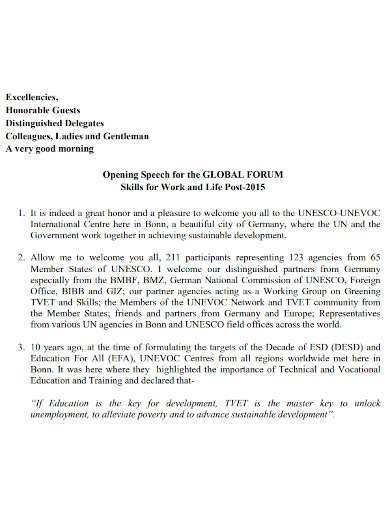
Invite the pastor to come to the front. A simple gesture of the hand, a smile, and a “Pastor Jones!” is all that is needed. If appropriate, wait at the front for the pastor to come to the podium; this is much more personal than returning to your seat while he is walking to the front. A hearty handshake or a warm hug is also appropriate, as it not only makes the pastor feel welcome, but assures the congregation that you endorse this person and the message he is about to share with them.
Give a quick background on the pastor and her regular ministry. If she pastors a church, is a traveling evangelist, or has done overseas missions, this is the time to share it. The congregation will feel more connected and ready to listen when they know something about her life and ministry.
How to Introduce A Speaker In Church Sample
Even before you start speaking to an audience, you should know that good introductions are crucial to effective speeches and presentations because an audience assesses the caliber of a speaker right from the start.
A rule of thumb suggests that an audience’s assessment of a speaker is largely formed in the first 30 seconds of a talk. You can get those 30 seconds off to a good start by providing a sparkling introduction. Create the ideal environment for a speaker to be well-received by the audience right away through a sparkling introduction. It is remarkable how many introducers ramble when they introduce a speaker – they give their life history. In fact, words of introduction are fumbled more than any other aspects of a speech because the introducer doesn’t know how to do it well. Maximum impact comes from a concise introduction, when the audience is told why the speaker was invited. This approach cuts out the fumbling background information that is given in many introductions. The safest approach for an introduction is to write out a script (sample below) below. The recommended way to make an introduction of a speaker is:
Introduction of Guest Speaker Sample Script
- Be brief. It’s not necessary to speak for more than one minute – preferably less
- Speak informally, as you would to good friends. Look around the audience.
- Be enthusiastic about your task. Make your introduction sparkle. You owe it to the person you are In your brief talk, introduce and engage your audience. Act as though it is a real privilege to introduce this speaker, feel happy about it – talk with real excitement.
- Avoid Stale Phrases such as: “It is indeed a pleasure … a man who needs no introduction … we are gathering here tonight …” Also, avoid giving the Speaker false starts by announcing their name too many times during the introduction.
- Above all, be warm and sincere. Here is a proven “TIPS” formula to use for a 30-60 second introduction. Topic Firstly, speak of the topic, giving the exact title of the talk. Importance Tell the audience why this topic is important to them. Present Speaker Tell the audience your speaker’s qualifications. As the final two or three words of your introduction, give the speaker’s name. Be sure to say it clearly and distinctly. SAMPLE: Imagine you are due to introduce John Smith, a certified public accountant, as speaker at a business lunch. You can’t go wrong with this (unless you read it verbatim and in a clumsy way!): T (Topic) “Today we are here to listen and learn on ‘How to avoid the mistakes of unsuccessful businesses.” (Importance) “In its latest business survey last month, the Bureau of Statistics reported that unsuccessful businesses fail for three main reasons. Since we are all business people, we are eager to learn how we can avoid these three pitfalls and ensure our businesses remain viable.” PS (Present Speaker): “Our speaker has had a distinguished career in accounting. Seven of his articles have been published in The Accounting Review and The Journal of Accounting Practice, and he is on the board of the National Institute of Chartered Accountants. He has studied the Bureau’s report and has some important advice for us today.” “Ladies and gentlemen, please welcome [pause]” or, “I am pleased to present [pause] JOHN SMITH!” M&R Games LLC Page 1 of 2 Distinguish Yourself When You Introduce a Speaker If you give it careful thought and preparation, you will make the Speakers presentation even more successful … and as a bonus you will also establish your professionalism as an introducer. REMEMBER an introduction serves two purposes:
- It acts as a bridge, a transition from one part of a meeting to another. It gives the audience time to make a mental and emotional shift.
- It prepares people for the speaker, heightening their sense of openness and anticipation. Your task is to introduce the speaker, not to take center stage. The spotlight is on you for only a few moments so that you can help make it shine … where it really belongs—the speaker. So keep it brief. For informal gatherings of 30 seconds is plenty. For larger events, aim for no longer than a minute. Under certain conditions, For a very formal event with a very important speaker, you may need two minutes.
- Research. If at all possible, talk to the speaker at least a week in advance of the event. Find out what he or she will be talking about and why it has relevance to your audience. Then learn as much as you can about the speaker’s experience, education, life, interests, and accomplishments—whatever helps establish the speaker’s credibility on the topic he or she is addressing. NOTE: Many speakers can send you a resume or their own written introduction. Be sure you receive it in plenty of time to review to help you prepare your own remarks, but do not read it verbatim. (It is usually too long and self-aggrandizing.) Lastly, and MOST IMPORTANTLY make sure you know how to pronounce the speaker’s name.
- Prepare a 3-part outline. A good introduction tells people why the speaker is talking about this subject at our event. The first part of your introduction should state a common issue or interest that the audience shares. The second part briefly (in a sentence or two) states how today’s presentation will help them solve that issue or help enhance their interests even further. And the third part of your introduction establishes the speaker’s credentials — convinces the audience that the speaker knows what he or she is talking about.
- Your performance. Walk to the podium with confidence. Arrange your notes quickly and adjust the microphone, so that you mouth will be close enough to it. Take a breath. Look at the audience and smile. Your skillful introduction will create a pleasant harmony between subject, audience, occasion, and speaker. And then comes your critical moment as an introducer-the moment of presentation. At the end of the last sentence of your introduction, with a climactic intonation of unmistakable finality, announce your speaker’s name. Announce it clearly and with sharply increased volume. Continue to face the microphone and your audience as you deliver the speakers name, so that their name is not lost through a premature turn of your head. Then swing swiftly about and face your speaker with an alert expression of friendly welcome on your face. Remain standing in this position until the speaker rises and acknowledges your introduction. ALWAYS remain at the podium until the speaker arrives. Shake their hand and step back from the podium, handing it over symbolically to the speaker. Then sit down.
Introducing A Guest Speaker Speech Examples pdf
This is a speech that introduces a guest speaker. It is short, but it gives the audience a sense of who the guest speaker is and why they’re important. It’s also great for getting the crowd excited about what’s to come!
Today I’m honored to introduce our guest speaker, Dr. David Smith.
Dr. Smith is a professor of English at the University of Albany, where he has taught for over 30 years. He specializes in the works of William Shakespeare and has written extensively on the subject of literary criticism. His first book, The Influence of Shakespeare on Dostoyevsky’s “The Idiot” was published in 1990 and received widespread critical acclaim. His second book, Shakespeare’s Hamlet: A Critical Study was published in 1996 and was also widely praised by critics and peers alike.
In addition to these two books, Dr. Smith has written several articles that have been published in prestigious journals like [publication name].
He is also a sought-after lecturer who has spoken on topics ranging from “Shakespeare’s Influence on Romanticism” to “The Significance of Love in The Merchant of Venice.” To date, he has given over 100 lectures worldwide!
How to Introduce a Pastor to a Congregation
Thanks for visiting Church Speech Templates. Here are some sample welcome speeches that you can adapt for your upcoming event. Please feel free to use these as inspiration to spark your own original ideas!
Sunday earliest FIRST CHURCH SPEECH WELCOME Happy morning! I’d like to welcome you to [CHURCH NAME] in the name of [NAME]. If this is your first time here, we want to welcome you and wish you a comfortable stay. We are excited to worship with you for the ensuing [service time period, i.e. hour]. Please fill out the contact card you can find in [location]; we’d love to learn more about you.
Please keep in mind [insert any relevant details concerning child care, cell phone use, or anything else here].
Join me in prayer, if you would. [Prayer here] Join me in singing [song title] when the worship team steps forward.
SPEECH #2: WELCOME TO CHURCH Hi! We are really happy that you decided to join us this morning. My name is [name]. If this is your first visit to [church name], please know how happy we are to have you. I’m hoping that our relaxed atmosphere will make you feel at ease. I also want to tell you about [insert any relevant details concerning childcare, cell phone use, or anything else here]. Finally, if you have a moment, kindly complete the comment card located at [location]. We’d want to learn more about you so we can see how we might be of service to you in prayer for you.
Let’s pray for God’s blessing on our time together. [Prayer here] [Present next component]
Graduations Third Welcome Speech Good night. It is a joy to greet the families, friends, and teachers of our [year] graduating class. My name is [name]. These graduates’ first years at [school name] seem to have been just yesterday, and now we are recognizing their outstanding achievements.
We wish to express our gratitude to each and every one of you for your assistance in bringing these students here. Their [high school, middle school, college, etc.] career has been successful because to your sacrifice. I’m grateful.
We’ll hear from a few students and members of the faculty during the program, award diplomas, and send the graduates on their way. [Put any necessary components here]
Please don’t forget to [insert crucial information]. Now join me in welcoming [next speaker/presenter].
Fourth Welcome Speech My name is [name], and the staff and I would like to extend a warm welcome to the families and friends of the [year] graduates of [school name]. We anticipate recalling a few of the amusing and motivational tales from the last [number] years.
Without the love, support, and inspiration of each and every one of you present tonight, this trip would not have been possible. The staff and students would want to thank you for the significant part you played in this evening before we even get started.
Last but not least, we want to remind you of [insert significant information]. Please join me in extending a warm welcome to [next presenter/speaker].
sociable events These standard addresses are beneficial for gatherings like picnics, potlucks, welcome-back meals for students, and other similar events.
5th WELCOME SPEECH Greetings to all. Just wanted to say how much I appreciate you coming out. It’s great to see so many recognizable faces. I’m [name] and we [if applicable, put the name of the church or group] would want to give you a warm welcome if this is your first time visiting us. We hope you can take advantage of this opportunity to establish some significant contacts and relationships.
Before we begin, a couple of things: [Put any pertinent details here]. As I say goodbye, we’ll begin by [insert instructions for the subsequent element]. [Discuss any additional events that will take place during the gathering]. If appropriate, [insert a prayer]
Sixth Welcome Speech Welcome! If you don’t already know me, my name is [name] and I’m from [organization or church]. We’re thrilled that you could all join us for [name of gathering] and we hope to see you all again soon. If you’re new, welcome to the group! We’d all appreciate the chance to get to know you better.
We’re here today for [reason—it could be anything as straightforward as the chance to have a dinner together and socialize]. It’s going to be a fantastic night filled with food, entertainment, and [add other things that will happen].
I’ll take my leave in a moment, and then we’ll [insert directions]. Please take notice of [essential notes or details.] Again, thank you and welcome!
Related posts:

Join the conversation Cancel reply
Your email address will not be published. Required fields are marked *
Save my name, email, and website in this browser for the next time I comment.

Welcome Speech for Guest
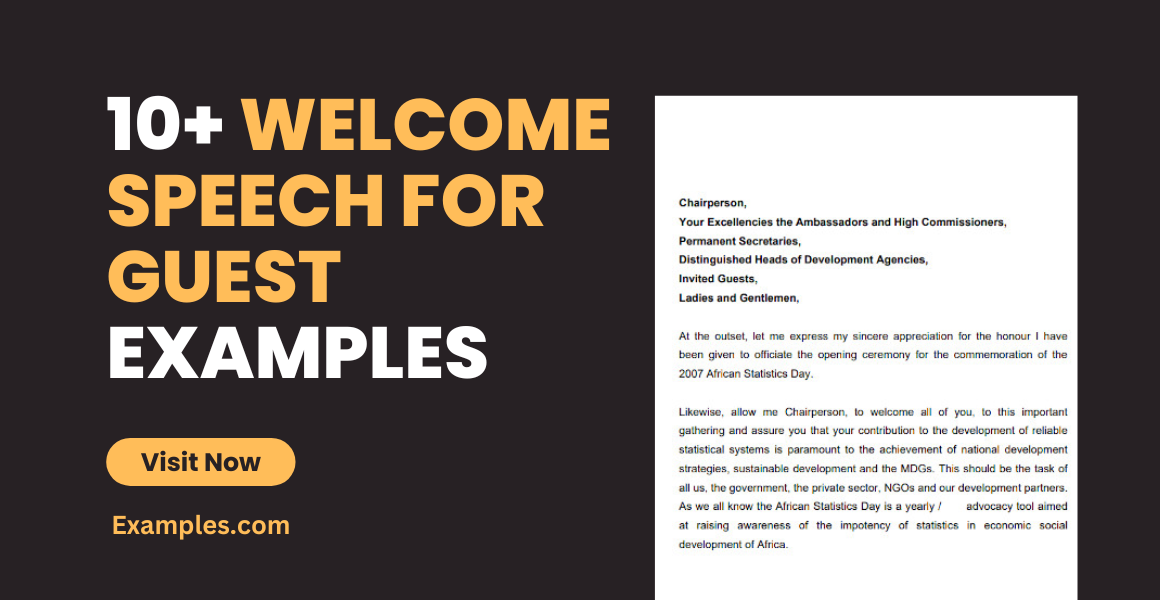
Have you ever been to a seminar or a lecture wherein you get to be the guest of honor? Better yet, were you given the opportunity to welcome a guest speaker for a seminar? How did it go and what did you do? Welcome speeches are used to simply welcome a guest speaker to an event. To introduce the agenda and to simply draw the attention of the audience to the person talking. Let’s say you were given the opportunity to do the speech, are you excited or nervous? If both, that’s okay. This article is here to help you to write a good welcome speech for a seminar, a lecture and to introduce the speaker.
10+ Welcome Speech for Guest Examples
1. opening ceremony welcome speech for guest.
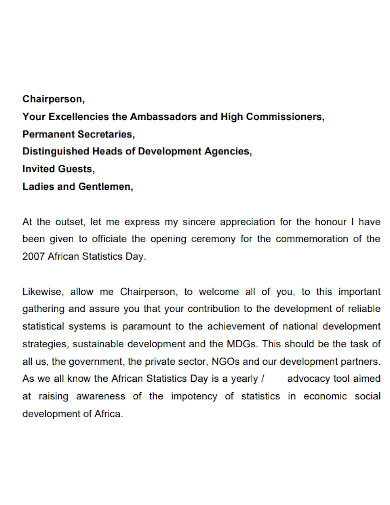
Size: 11 KB
2. Formal Welcome Speech for Guest
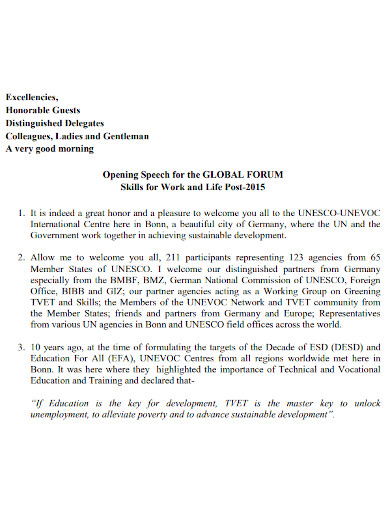
Size: 39 KB
3. Project Management Welcome Speech for Guest

Size: 49 KB
4. Sample Welcome Speech for Guest
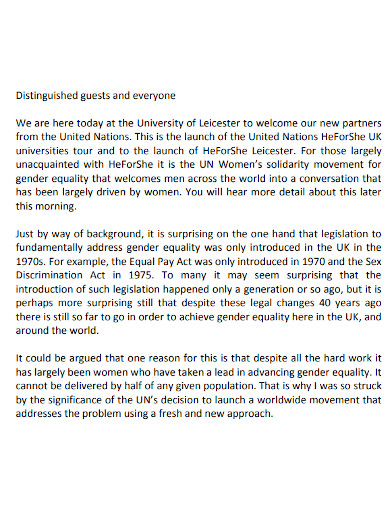
Size: 273 KB
5. Welcome Meeting Speech for Guest
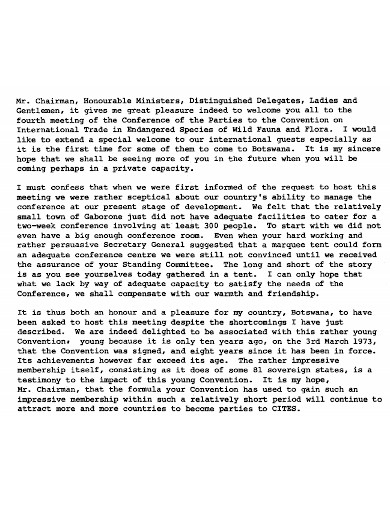
Size: 898 KB
6. Welcome Speech for Guest in Seminar

Size: 144 KB
7. Welcome Speech for Guest Lecture
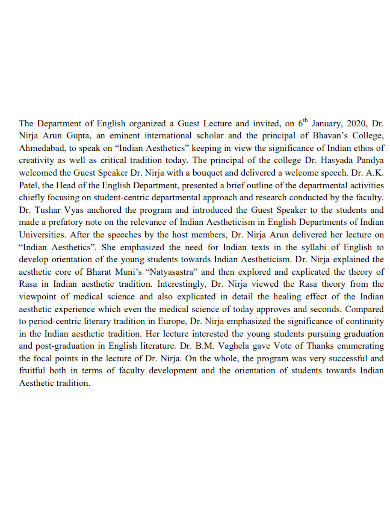
Size: 422 KB
8. Welcome Speech for Guest on Occasion
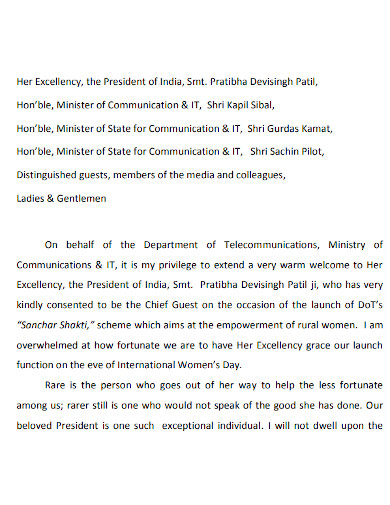
Size: 499 KB
9. Welcome Speech for Guest Speaker
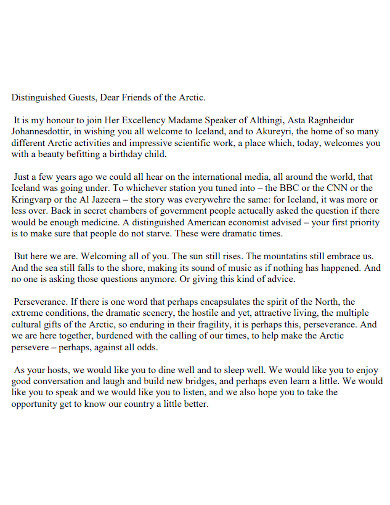
Size: 69 KB
10. Welcome Speech for Guest Vice Chairman
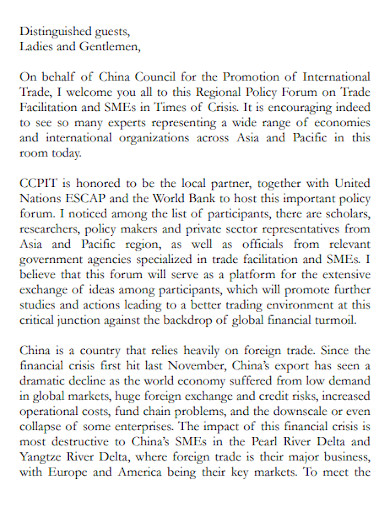
11. Professional Welcome Speech for Guest
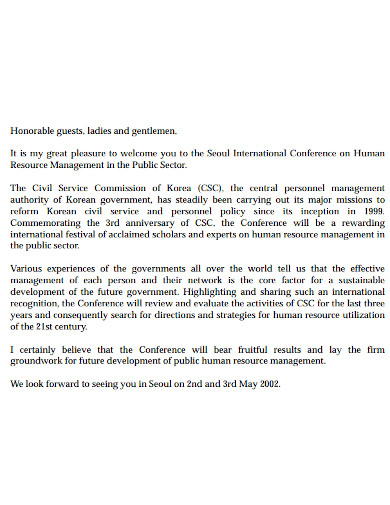
Size: 63 KB
Definition of Seminar
A seminar is an event where people gather to listen, study and discuss a particular topic. They would listen to a speaker or an expert discussing a topic, and would welcome discussions later.
Definition of Lecture
A lecture is a formal discussion on a serious topic given by an individual or a group of people. Lectures are often given at a university or college and their audiences are usually college students.
Tips on Giving Welcome Speeches
Anyone who has ever given a speech would most likely understand stage fright can be a big issue. But there is a way to stop that as well as to present a good welcome speech like a pro. Here are some tips to help you succeed in delivering that carefully written welcome speech.
- Practice makes perfect – We all heard the old saying “practice makes perfect”. This can be true for this type of situation. Doing some practice before you deliver your speech can actually help you. Start off by asking a friend to help you. Let your friend give you some feedback and go from there.
- Breathe – Once you are done practicing and you are about to deliver your speech, breathe. Without getting enough oxygen, you may feel dizzy and most likely would you feel stage fright. People get nervous when they feel they are out of breath, so breathe in and out before you go and say that welcome speech.
- Voice – Your voice should reach the last row of the audience. Make sure you can be heard clearly and correctly. We would not want any misunderstandings when presenting the speech.
- Maintain eye contact – If you want to draw attention from your listeners, maintain eye contact at all times. Avoiding eye contact would make your listeners believe that you are not interested in getting their attention. In addition to that, it is also polite to look at the audience when you are speaking.
Why are welcome speeches necessary?
A welcome speech is necessary as this is a way of welcoming people who attended the ceremony. This is also a way of introducing the speaker, the agenda and the people in charge of the event. Without all this, the listeners or the audience would feel lost. Think of a welcome speech as a guide for the people who are attending the event.
Do all events need a welcome speech?
Most events like wedding receptions , lectures, awards ceremonies, and church events often use welcome speeches before starting the actual event.
Is it expected to mix a thank you speech with a welcome speech?
You may also add a thank you speech alongside your welcome speech. As it is usually mixed or closed together. But a welcome speech’s use is to draw your audience attention in. While a thank you speech is to simply show your gratitude towards them for attending the event.
Writing and presenting a welcome speech can be both terrifying and exciting. Terrifying if you have bouts of stage fright. Exciting since you also feel the importance of introducing a speaker to a good seminar. Presenting a welcome speech can be a bit scary but if you follow the tips given, you will do just fine. Remember to simply practice before you get up on stage and talk.

Welcome Speech Generator for Guest
Text prompt
- Instructive
- Professional
Tips for writing a warm welcome speech for guest
How to make your welcome speech for guest feel special

IMAGES
VIDEO
COMMENTS
Here are some key elements to keep in mind for how to introduce a guest speaker successfully. 1. Research and gather information. Before introducing the guest speaker, conduct thorough research to gather relevant information about their background, achievements, and expertise. This will help you create an introduction that is both personalized ...
1. Keep the introduction under 1 minute. Remember that you are there to introduce the guest speaker and that your introduction is just the precursor to the main talk. Keep your piece to about 30 to 40 seconds, a minute at most. A few short paragraphs are usually enough to set the stage.
Tips for introducing a guest speaker. 1. Don't talk too long. Keep your introduction to between 45 seconds to 3 minutes. 2. Bios are a great place to get information. Almost all speakers will have a bio online or the event planner may have a copy of their bio. You can also search their name online for other interesting tidbits about them, but ...
A guest speaker introduction is a short speech delivered to pique the audience's interest, establish the credibility of the speaker, provide a preview of the topic as a promise, and say whatever the speaker cannot say. A good guest speaker intro is best delivered in less than two minutes. And though some speakers may not need an introduction ...
The job of an introduction speech is to: introduce your guest speaker, give them a warm welcome, and create ready-and-motivated-to-listen anticipation in the audience. Essentially you are the warm-up act. Your task is to focus and unite the audience members, to get them ready for what is to come. Return to Top.
How to Memorably Introduce Another Speaker. by. Deborah Grayson Riegel. October 18, 2016. As a professional speaker and facilitator for over 20 years, I've been introduced more than a thousand ...
Speaker Introduction Framework 1. Here is a very solid framework to start with that I have used for many years. I was taught this by Ron Tachhi who was a very successful speaker and then ran a large Speaker Bureau in Australia. His was based on a framework taught in the Toastmasters Training.
You can begin with a simple "Good morning/Good evening, ladies and gentlemen"; then state the purpose of your speech — introducing the topic, the purpose of the speech, and the guest speaker. You must effectively establish the speaker's qualifications. Introduction speeches are considered commemorative speeches in the sense that they ...
While your introduction is as good as a short speech, we must not forget the keyword here - short! The main spotlight is for the speaker. So keep your intro short. Below 2 and a half minutes is usually a good space to be in. Exceeding 4 minutes is a little too much so make sure to not overstep your speaking time.
Learn how to introduce a guest speaker or keynote speaker the right way. Follow my detailed sample introduction, or use my simplified template to create a po...
Learn how to introduce a speaker correctly with my sample script. Whether you're introducing a guest speaker or a keynote speaker, these 3 steps are key. 🗒️...
Here are my seven best tips for introductions: 1. Keep it brief 2. Do your research 3. Make it personal 4. Don't steal the show 5. Practice your introduction 6. Establish the speaker's authority 7.
Tip #2: Inspire Confidence in Your Audience. Remember, this introduction is not a speech of your own. The focus must remain on the professional speaker and what they are about to contribute to the event. Guest speakers bring varying levels of name recognition, so your audience may or may not be aware of their qualifications.
1. Make the Introduction Engaging. The speaker is important, but the audience is equally important and is an even higher priority. The audience needs to have a reason to listen to the speaker. They need to understand why the speaker is the authority and why their words are worth their time.
The work of a good introduction is to raise the speaker to celebrity status for the purposes of that occasion. Always end with an applause line for the speaker — "so please join me in welcoming Jane Doe!" — to allow her time to get up on the stage and ready to go. And it's a very good idea to shake the speaker's hand as he or she ...
INTRODUCTORY SPEECH - USAIN BOLT. It is both and honor and a privilege to be able to introduce you to a role model of note, a man of distinction - Usain bolt. Usain Bolt is a Jamaican sprinter and he was born on 21st of August 1986. Usain has distinguished himself as a world class sprinter and he holds the Olympic and World Records for the 100 ...
Examples of Introducing a Guest Speaker to Captivate Your (Virtual) Audience. This video gives you, hosts and emcees a 4 Step Formula, with proven examples, ...
It's a simple technique, and it makes a powerful difference. So when you review a draft of your speech, look for how to use "you" as often as possible. Be yourself: Don't try to be someone you're not. Speak from the heart, stay true to your values, and let your personality shine through. Remember, you're the guest speaker for a reason!
Introducing a Guest Speaker to the Audience (5 SIMPLE STEPS) // Want to introduce a guest speaker at your next public speaking gig? Did you know your guest s...
Never try to give a speech of introduction strictly from memory, always make notes. 1. Remind the audience why the topic is important to them. 2. Establish the speaker's qualifications to speak on the topic. 3. Get the presentation off on a high note by establishing an up-beat tone. 4.
Here is a proven "TIPS" formula to use for a 30-60 second introduction. Topic Firstly, speak of the topic, giving the exact title of the talk. Importance Tell the audience why this topic is important to them. Present Speaker Tell the audience your speaker's qualifications. As the final two or three words of your.
\\ Example of Introducing a Guest Speaker //If you're looking for public speaking tips and public speaking for dummies isn't cutting it, this video will show...
Welcome speeches are used to simply welcome a guest speaker to an event. To introduce the agenda and to simply draw the attention of the audience to the person talking. ... that's okay. This article is here to help you to write a good welcome speech for a seminar, a lecture and to introduce the speaker. 10+ Welcome Speech for Guest Examples 1 ...